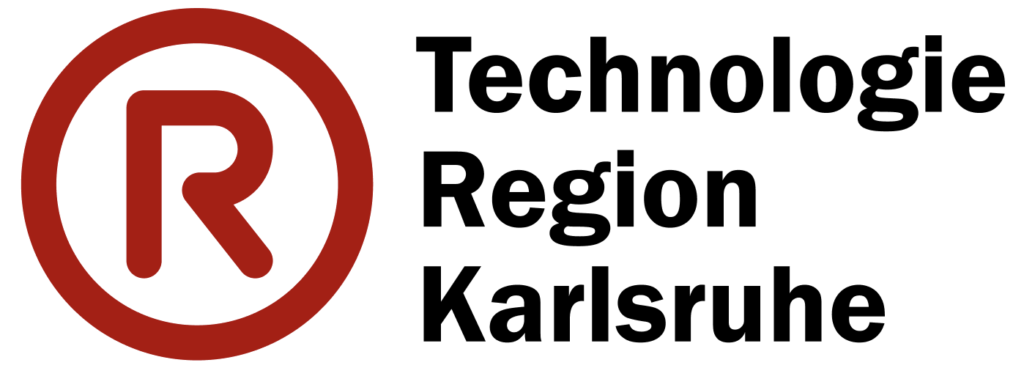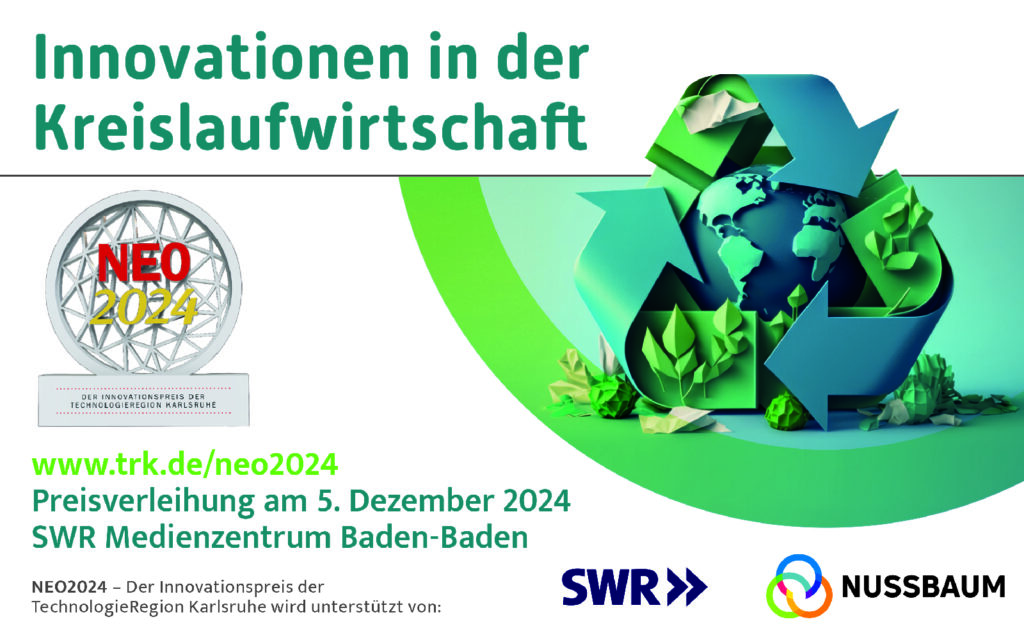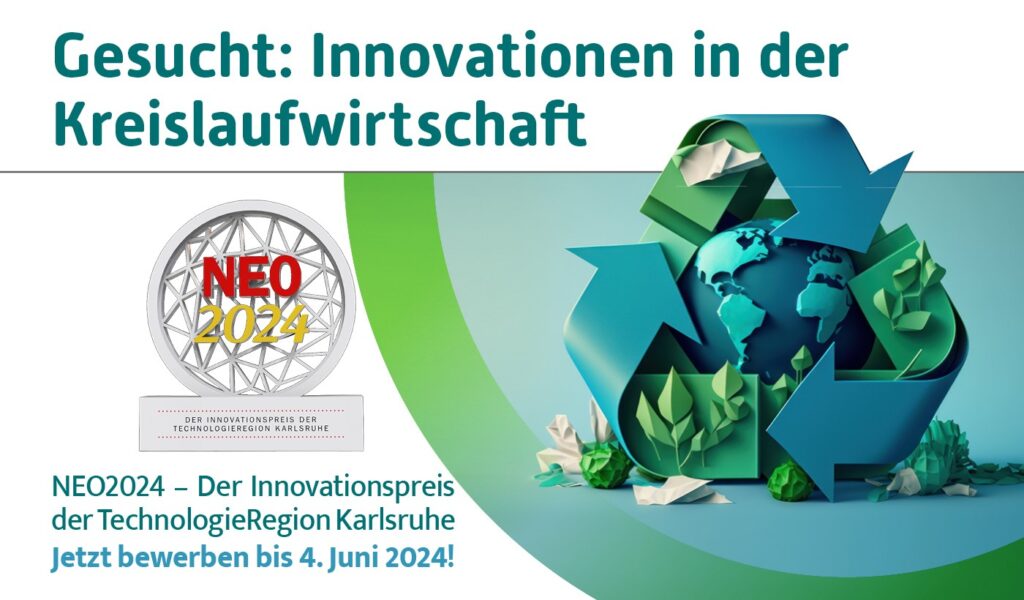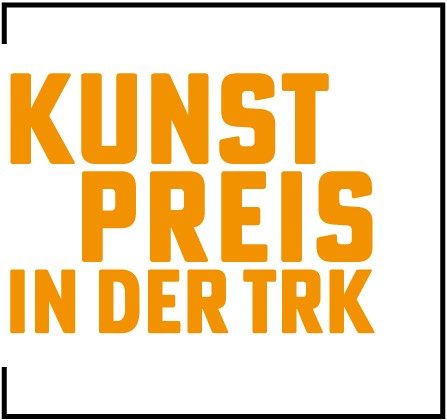Press
Would you like to report on the Karlsruhe TechnologyRegion (TRK)? We are available for interviews, press appointments or requests for image material. In our press section, media representatives can find information on press contacts and our latest press releases.
Press contact
For press inquiries or if you require further information on an event or image material, please contact us at:
Latest news
Press representatives will find the latest press releases in this overview. Do you need information from our archive? We will be happy to help you - please contact us directly.
Rastatt mobility pact is extended and grows
Date of publication:
October 18, 2024
Steering committee decides to extend the term by a further five years. City of Baden-Baden becomes new partner.
Under the leadership of Elke Zimmer, State Secretary in the State Ministry of Transport, the partners of the Rastatt Mobility Pact met on Friday (October 18) for the fourth steering committee meeting. The focus was on reaching an agreement on the continuation of the Mobility Pact for a further five years from January 2025. A new partner, the city of Baden-Baden, also came on board.
State Secretary for Transport Elke Zimmer said: "I am delighted that the successful cooperation between the partners in the Rastatt Mobility Pact is continuing and is now even being expanded with Baden-Baden. When it comes to climate protection and the transport transition, it is crucial that many institutions pull together and network optimally. Mobility pacts such as the Rastatt pact are valuable role models in this respect. I would like to thank everyone involved for their inspiring cooperation over the past five years. On a positive note, I would like to emphasize that the partners have placed an even stronger focus on improving sustainable mobility services and have paid particular attention to the needs of commuters."
District President Sylvia M. Felder emphasized: "Since its foundation in 2020, the Rastatt Mobility Pact has developed into an established mobility network in the region. Since then, many measures for climate-friendly mobility have been initiated and implemented, such as the cross-border bus route 231 F between Soufflenheim/Seltz and Rastatt, which has been running since December 2022. I look forward to working together with all partners over the next five years."
Dietmar Späth, Lord Mayor of the City of Baden-Baden, explained: "We are convinced that the challenges in the area of mobility can best be mastered together. Having already been involved in individual projects as a partner, full participation in the Mobility Pact is the next step for us in order to participate in all relevant projects for sustainable mobility. We look forward to working together and finding creative solutions."
In addition to the introduction of the cross-border bus route 231 F, further projects have been successfully advanced and implemented during the first term of the Mobility Pact. Of particular note here are the commissioning of several regional bus lines in the district of Rastatt, most recently the regional bus line X44 from Bühl to Bad-Herrenalb as well as the bicycle-friendly conversion of the Rastatt Franzknoten and the expansion of bicycle parking facilities and charging stations in the participating companies. In September 2022, the regiomove Port at Rastatt railroad station was also put into operation and an integrated mobility concept was developed for the city of Rastatt.
Outlook
The official start of the second term will be marked by a kick-off event in spring 2025, at which the work program for the coming years will also be presented.
Background information
The Rastatt Mobility Pact was signed in January 2020 under the leadership of the Ministry of Transport to strengthen sustainable forms of mobility. In October 2024, it was decided to extend the pact for a further five years. The partners are the city of Rastatt, the district of Rastatt, the NVBW, the KVV, the Regionalverband Mittlerer Oberrhein, the Karlsruhe Technology Region and the local companies Getinge, Siemens and Mercedes-Benz as well as the Karlsruhe Regional Council, which is responsible for coordinating the pact. The city of Baden-Baden has been accepted as a new partner for the second term.
In the Mobility Pact, stakeholders from different areas work together to develop and implement solutions to promote climate-friendly commuter mobility. It is essential that all modes of transport (local public transport, road transport, walking and cycling) are considered and networked in favor of the environmental alliance. Operational mobility management also plays an important role, as commuter traffic has a significant impact on the traffic situation.
Information on the mobility pacts in Baden-Württemberg
There are currently five mobility pacts in Baden-Württemberg under the political leadership of the Ministry of Transport. A further mobility pact was founded in the Rhine-Neckar region on a cross-state basis. It is managed by the Rhine-Neckar Region Association (VRRN). Further information can be found at the following link: https://vm.baden-wuerttemberg.de/de/politik-zukunft/nachhaltige-mobilitaet/mobilitaetspakte/

Circular economy of the future: NEO2024 innovation award finalists announced
Award ceremony on December 5 at the SWR Media Center in Baden-Baden
Date of publication:
October 16, 2024
TechnologieRegion Karlsruhe GmbH is once again awarding the prestigious NEO innovation prize this year. The NEO2024 is themed "Circular Economy" and honors outstanding innovations that focus on the sustainable use of resources.
After a multi-stage selection process, the jury of experts selected five projects as finalists that impressed with their innovative strength in areas such as recycling, material use and CO₂ reduction:
- Concular GmbH with "Concular Software"
Concular enables the digital recording and reuse of building materials. With the Life Cycle Passport, materials from a building are documented so that they can be reused during dismantling. This reduces construction waste and significantly lowers CO₂ emissions.
- EDENergy / Fraunhofer ISE spin-off with "EDENergy - Sustainable electricity storage using second-life batteries"
EDENergy integrates discarded batteries from e-bikes and e-scooters as electricity storage for photovoltaic systems. Through the innovative use of gallium nitride-based technology, EDENergy enables an efficient and sustainable storage solution that both saves costs and reduces the carbon footprint.
- Gerhard Lang Recycling GmbH with "New aluminum scrap sorting using laser-induced plasma spectroscopy (LIBS)"
In one of the most modern sorting plants in the world, aluminum alloys are recycled by type in Gaggenau. Using LIBS laser technology, automotive aluminum scrap is sorted in such a way that it can be recycled without the addition of primary aluminum, which results in significant energy and raw material savings.
- Karlsruhe Institute of Technology (KIT) - TVT with "NECOC - Negative emissions through carbon generation from atmospheric CO₂"
NECOC technology converts atmospheric CO₂ into solid carbon powder, which can be used as a raw material in the construction industry, for example. The technology thus makes a contribution to achieving climate protection targets and combines CO₂ reduction with an economical product.
- Rement / Spin-off KIT IMB/MPA with "Rement - Creating added value from concrete and CO₂"
Rement offers a CO₂-negative technology for upcycling concrete. This involves recovering sand from demolished concrete by type and making it usable for construction projects. In addition, CO₂ fed in is converted into high-purity calcium carbonate. This process enables economically efficient and environmentally friendly concrete recycling.
The NEO2024 award ceremony will take place on December 5, 2024, from 6 p.m. at the SWR Media Center Baden-Baden. From 4.30 p.m., participants will be able to experience the multimedia collaboration of the state-of-the-art media center up close during guided tours and at info points. In addition to the jury prize of 20,000 euros, an unendowed audience prize, donated by Nussbaum Medien, will also be awarded. The nominees will present their projects in short pitches before the winner is announced.
The laudatory speech will be given by Alexander Bonde, Secretary General of the German Federal Environmental Foundation. Mario Brandenburg, Member of the Bundestag, Parliamentary State Secretary to the Federal Minister of Education and Research and Dr. Frank Mentrup, Chairman of the Supervisory Board of TechnologieRegion Karlsruhe GmbH and Lord Mayor of the City of Karlsruhe, will give welcoming addresses. The State Broadcasting Director of Baden-Württemberg and Deputy Director General, Stefanie Schneider, will welcome guests on behalf of SWR. The event offers the opportunity to network with leading figures from business, science and politics.
TechnologieRegion Karlsruhe presented itself successfully at the EXPO REAL real estate trade fair in Munich
Date of publication:
October 10, 2024
Nicole Razavi, Minister for Regional Development and Housing of the State of Baden-Württemberg, visited the joint stand to find out about the top regional developments for a future-oriented and circular real estate industry
The Karlsruhe TechnologyRegion (TRK) was once again represented with a joint stand at EXPO REAL, Europe's leading trade fair for real estate and investment, from October 7 to 9, 2024.
At the TRK stand, twelve partners informed the numerous visitors about top regional developments for a future-oriented and circular real estate industry. The exhibitors included evohaus, weisenburger, ADIRA - L'Agence de développement d'Alsace, Bartsch Rechtsanwälte & Steuerberater, dieBauingenieure, HUST Immobilien, JOHNNY architecture, the Karlsruhe Institute of Technology (KIT), Volkswohnung, the Vollack Group and the business development agencies from Baden-Baden and Karlsruhe.
"Expo Real is the perfect forum to present Baden-Baden as a business location and to exchange ideas with all relevant market participants in a short space of time." Said Baden-Baden's Lord Mayor Dietmar Späth on site in Munich.
The stand partners were delighted to receive visits from Minister Nicole Razavi (Minister for Regional Development and Housing of the State of Baden-Württemberg) and Mr. Michael Kleiner, Ministerial Director at the Ministry of Economic Affairs, Labour and Tourism of Baden-Württemberg, who were able to find out first-hand about the projects and key topics in the Karlsruhe TechnologyRegion.
Jochen Ehlgötz, Managing Director of TechnologieRegion Karlsruhe GmbH, was also satisfied: "The consistently positive feedback from our stand partners regarding their business contacts at the trade fair and the overall optimistic outlook for a recovery in the construction industry in the coming months are extremely pleasing."
A particular focus was placed on the sustainable management of real estate throughout its entire life cycle. By using renewable building materials that bind carbon dioxide and innovative software solutions for evaluating and documenting alternative building designs, new approaches to reducing CO2 emissions and increasing efficiency in the real estate industry were demonstrated. These developments, which are being driven forward in the Karlsruhe TechnologyRegion, offer concrete solutions for the challenges of the future.
You can find more information about the trade fair on our LinkedIn and Facebook profiles, as well as online at EXPO REAL (trk.de).
"Freedom art" from the amateur sector wanted
Date of publication:
September 18, 2024
Entries for the TRK Culture Prize extended until October 13
In order to give even more artists from the Karlsruhe TechnologyRegion a chance, we have extended the deadline until October 13 and have now also opened up the opportunity for individual artists to apply with up to two works on the theme of "Freedom Art". We are still looking forward to the artistic interpretations!
And another event note in this context: On September 25, 2024 at 6 p.m., the 17th KulturLounge of the KulturRegion Karlsruhe will approach the term "Freedom Art" from an art historical and contemporary perspective in an online panel discussion. You can take part in this event conveniently via Zoom and we cordially invite you to join us! Simply send an e-mail by September 23, 2024 to: [email protected], with the subject "Freedom Art" and you will receive the access link. Participation is free of charge.
The official invitation to tender and the application form are also available online at www.trk.de/kult.
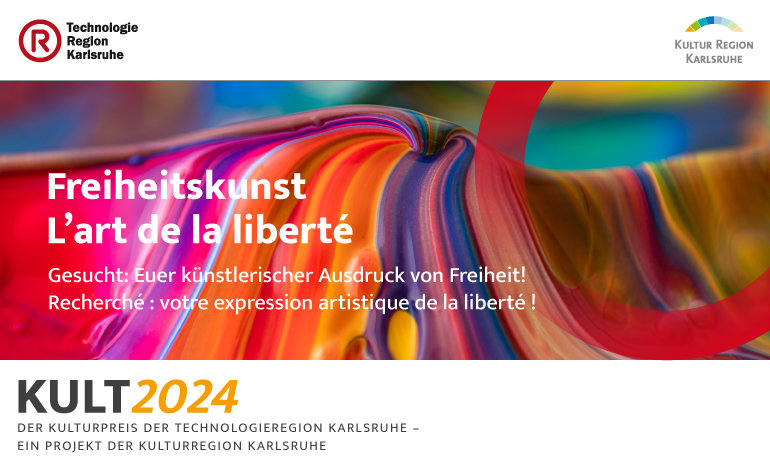
The Karlsruhe TechnologyRegion presents itself at the EXPO REAL real estate trade fair in Munich
Date of publication:
September 17, 2024
Joint stand with twelve partners showcases top regional developments for a future-oriented and circular real estate industry
The Karlsruhe TechnologyRegion (TRK) is once again represented with a joint stand at EXPO REAL, Europe's largest trade fair for real estate and investment. From 7 to 9 October 2024, around 2,000 exhibitors from 72 countries worldwide will be presenting their services to 45,000 participants in Munich, focusing on the topics of sustainability, digitalization and the transformation of the real estate industry.
The following companies will be providing information at the TRK stand this year: evohaus, weisenburger, ADIRA - L'Agence de développement d'Alsace, Bartsch Rechtsanwälte & Steuerberater, dieBauingenieure, HUST Immobilien, JOHNNY architecture, KIT - Karlsruher Institut für Technologie, Volkswohnung, Vollack-Gruppe, Wirtschaftsförderung Baden-Baden and Wirtschaftsförderung Karlsruhe.
The sustainable management of real estate over its entire life cycle makes it necessary to reduce CO2 emissions from construction to demolition. Renewable building materials fix carbon dioxide and are therefore a key lever for reducing emissions and protecting the climate. Dependence on raw materials and the increasing need to internalize disposal costs can also be reduced in this way. Innovative production processes and software solutions developed in the Karlsruhe TechnologyRegion for the documentation and evaluation of alternative building designs are creating new opportunities for an efficient and future-oriented real estate policy.
"We cordially invite you to our stand. There you can find out how sustainability in construction is developed and realized in our region in a holistic, affordable and future-proof way," explains Jochen Ehlgötz, TRK Managing Director and initiator of the trade fair appearance.
Since it was founded in 2017, TechnologieRegion Karlsruhe GmbH has been working successfully to strengthen the economic and innovation region. The topics of sustainable construction and affordable housing play a major role in the Karlsruhe TechnologyRegion. In addition to the ImmoTalks format, which has already taken place on the topic of "Bioeconomy in construction" and other current industry topics, the trade fair stand at EXPO REAL has been an important exchange, information and business platform for years.
Further information can be found at trk.de/expo-real and on our LinkedIn and Facebook profiles.
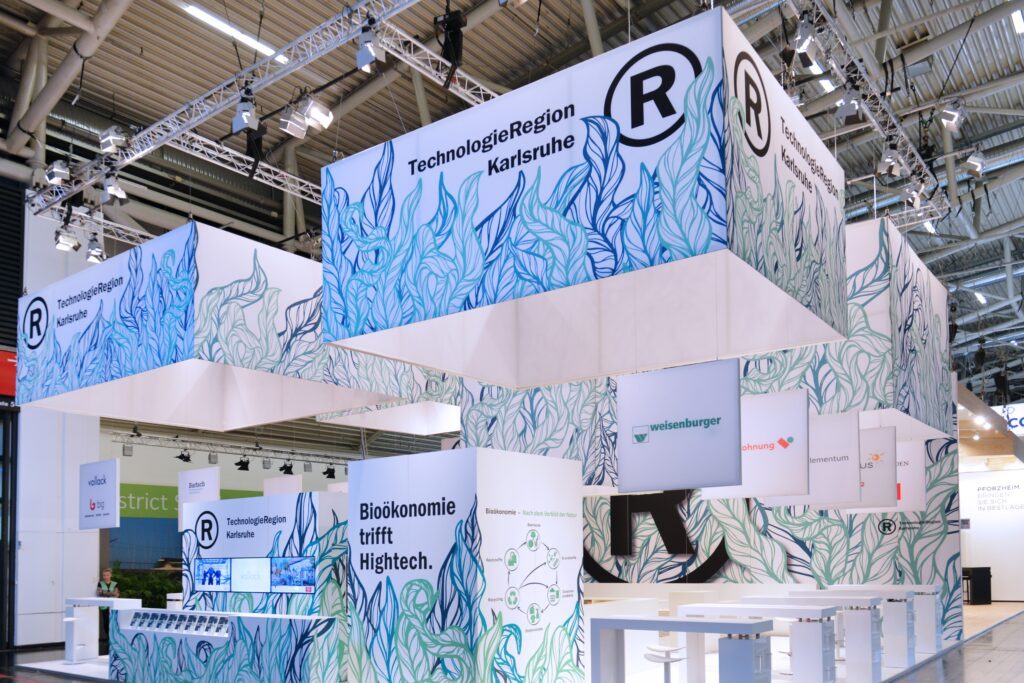
Schaeffler in Bühl opens modernized training center for the "Night of Training"
Date of publication:
September 09, 2024
Versatile program for the opening on 13 September 2024 from 5:00 to 10:00 pm
Schaeffler invites those interested in an apprenticeship, a degree plus apprenticeship or a dual study program and their families to the "Night of Apprenticeships" at the Bühl site. The event will take place in the newly designed training center in Bühl, which will be officially opened on this occasion. Schaeffler has invested four million euros in the modernization of the building. It now offers trainees and dual students around 1,700 square meters of learning space.
Personal exchange with trainees and contact persons from the company divisions
The modernized training center and its new premises will open their doors in Bühl as part of the "Night of Training". Visitors can find out about a total of twelve apprenticeships and study opportunities that Schaeffler offers at the site. These include the following apprenticeships: industrial mechanic, tool mechanic, electronics technician, mechatronics technician, industrial clerk, IT specialist, materials tester and stamping and forming mechanic. The Motion Technology Company offers several study options in Bühl: the dual study program in packaging technology as well as a degree plus training in mechanical engineering, mechatronics, electrical engineering or business informatics. Interested parties can find out about training content and student internships on site and get helpful tips on the application process and aptitude tests. There will also be the opportunity to take part in a speed dating application process directly on site, where potential professional contacts can be made in brief discussions. Personal exchange plays a central role at the "Night of Training". Contact persons from all professions and disciplines will be available to answer questions. In addition to the trainers, over 80 trainees will also be on site to take part in the various stations and provide exciting insights into their everyday working lives.
Future technologies you can touch
Visitors can gain insights into the technologies of the future at nine stations, the so-called technology cubes. These include additive manufacturing processes with 3D printers and augmented reality applications as well as robotics and a skills course. The workshop will showcase CNC technology, a high-precision machining process based on computerized numerical control, as well as self-programmed video games and virtual welding. Visitors compete against a robot in the "hot wire". Schaeffler will also be presenting tools and technologies that are part of vocational training and can be tried out directly on site.
Supporting program with DTM Innovation Taxi and HyCrafter
In the outdoor area, guests can view two show vehicles: the Schaeffler Innovation Taxi, an Audi R8 LMS GT2, which drives as a carrier vehicle for new technical solutions as part of the DTM, and the HyCrafter, a VW eCrafter, which shows Schaeffler products for electric vehicles with fuel cell drive. Music and food trucks will provide entertainment and refreshments during the event. There will be a photo box for souvenir photos in the indoor area. At hands-on stations, visitors can bend metal roses or laser mark wooden pencils, among other things. The virtual welding machine and video games can also be used.
Further information can be found at schaeffler.de
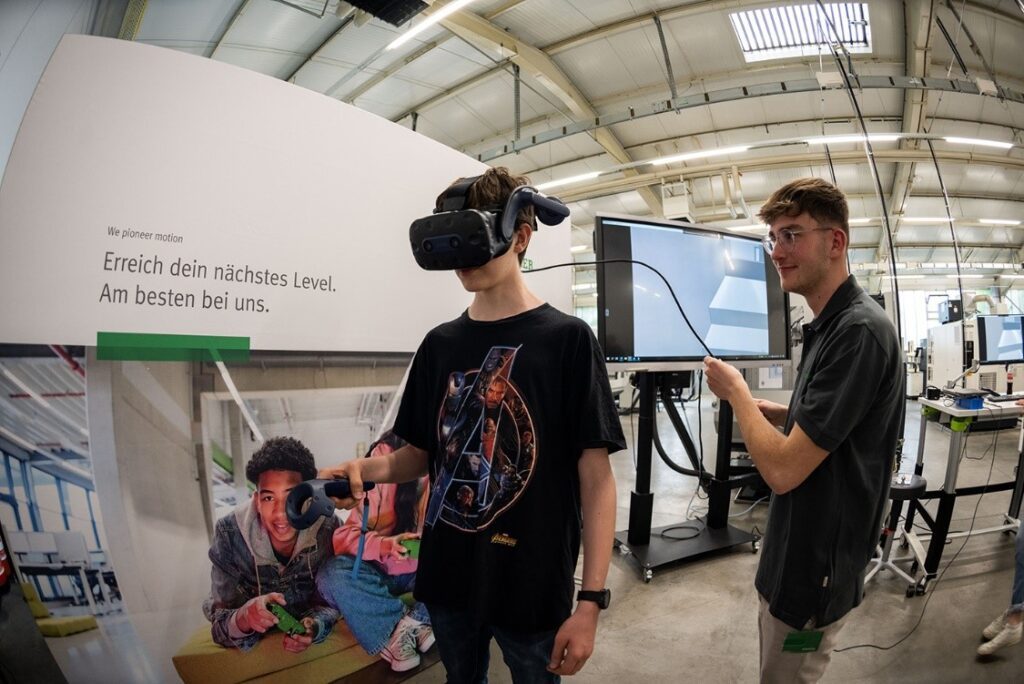
Everything can happen, everything is continuously developing
Date of publication:
August 05, 2024
Insights into the hydrogen economy in the port of Rotterdam
The Karlsruhe TechnologyRegion took part in the information trip to the port of Rotterdam organized by the Heilbronn-Franken Regional Association and Netze-Gesellschaft Südwest. The excursion on July 30 and 31 impressively demonstrated how the port is geared towards the production, import, conversion and onward transportation of hydrogen and ammonia. Today, over 13 percent of all energy imports into the EU already pass through Europe's largest port. By 2050, six percent of the hydrogen produced in the EU will be produced in the area's electrolysis farms and as much as 40 percent of all imports of green hydrogen, its derivatives and ammonia will be handled via Rotterdam.
The 50-strong delegation of mayors, local politicians, companies, scientists, associations and the energy sector saw the implementation of this strategy for themselves on site and visited the first electrolysis farm in the port area specially developed for these projects. A first 32 km long hydrogen pipeline connects the various hydrogen production and application areas there. The pipeline is also the first step towards a further connection to the industrial centers in western Germany. "Rotterdam is showing us how the strategic and practical implementation of the energy transition can succeed. Green hydrogen is of central importance here," emphasizes Jochen Ehlgötz, Managing Director of TechnologieRegion Karlsruhe GmbH.
Mark Stoelinga, Director of Energy and Infrastructure at the port company, also made it clear that the implementation of this comprehensive conversion was not without resistance and that constant flexibility is still required today in the face of new challenges. However, this is not deterring anyone on site: "Everything can happen, everything is continuously developing," he said, explaining how the difficulties are being dealt with. Andreas Schick, Managing Director of Netze-Gesellschaft Südwest, emphasized: "We have to think about energy supply from the bottom up. The aim is to achieve the lowest possible costs for the supply of sustainable energy".
In order to achieve the climate targets, we need the courage to do the necessary things and tackle them step by step. District Administrator Norbert Heuser, who led the delegation, is convinced that courage is needed to tackle the energy transformation in concrete terms. "COURAGE" has three letters, just as the secret to success has three letters - "DO". "We must take action if we are not to be left behind by the dynamic developments in the southwest." In addition to the impressive insights, the two-day excursion provided excellent opportunities to network and delve deeper into the topic.
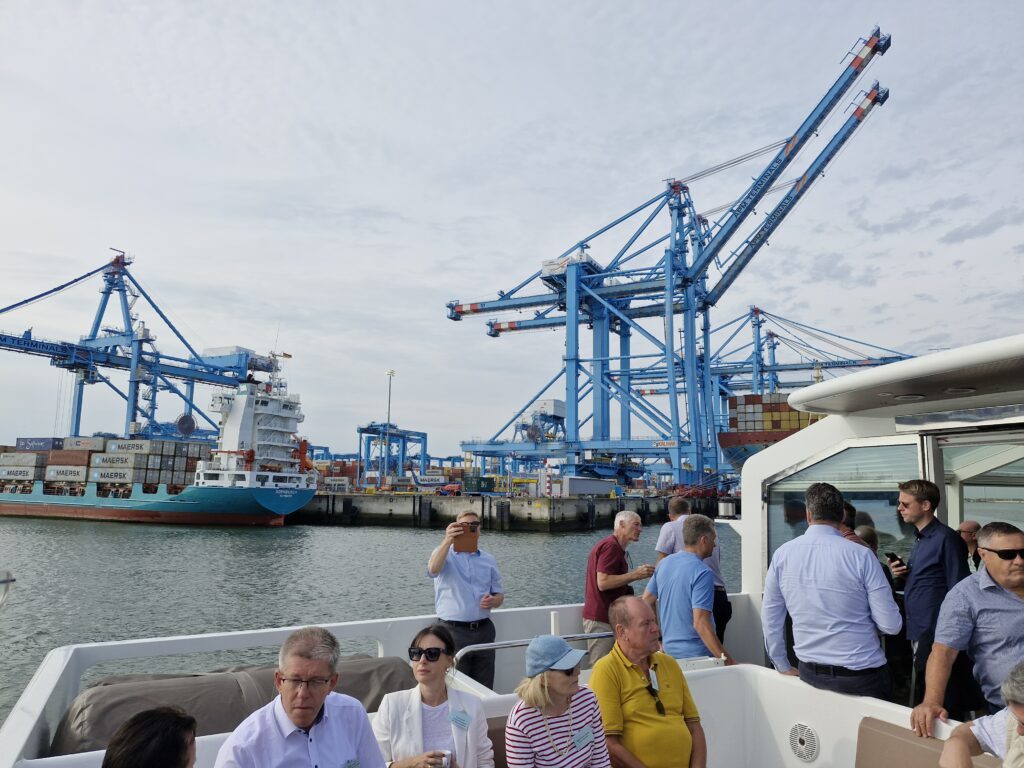
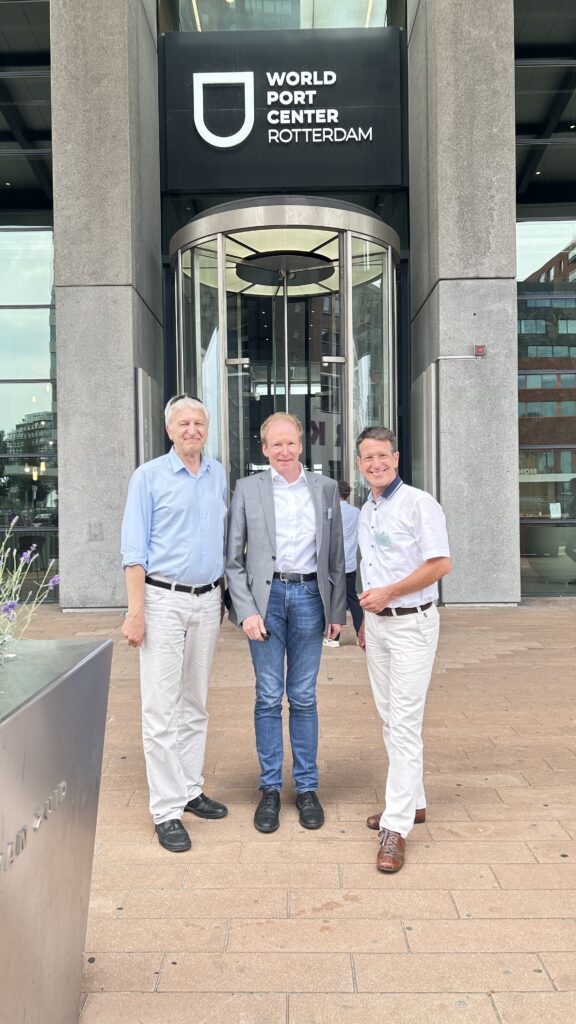
Karlsruhe to be connected to hydrogen core network
Date of publication:
July 26, 2024
TechnologieRegionKarlsruhe GmbH (TRK) welcomes the application submitted on Monday by the long-distance gas network operators for the realization of the hydrogen core network.
"For us as an economic development institution in the Karlsruhe region, it is important to be connected to the hydrogen core network at an early stage," emphasizes Jochen Ehlgötz, Managing Director of TRK. The plans presented envisage the construction of a new hydrogen pipeline from Ludwigshafen to Karlsruhe by the end of 2030. It has recently been speculated several times that the connection from Karlsruhe to the core grid could be delayed. "The large energy companies in Karlsruhe, such as the mineral oil refinery and EnBW, need planning certainty as quickly as possible in order to be able to tackle the necessary processes for converting to the environmentally friendly, CO2-free energy source," explains Ehlgötz. With the connection of Karlsruhe, however, it is not yet clear how the hydrogen is to be transported from the pipeline to the regions and on to the companies. Major energy consumers include cement works and the paper industry, which has a focus in the Murg Valley. Likewise, many medium-sized companies can only convert their energy-intensive production in a climate-friendly way with hydrogen. "Parallel to the connection to the hydrogen core network, we need a concept in the urban and rural districts as to how the existing natural gas network can be converted to hydrogen in the near future," demands TRK and believes that the natural gas network operators have a duty in this regard. "However, this can only be done in coordination with the local authorities and the heating plans there in order to synchronize the expansion of the often planned heating networks with the conversion of the natural gas networks to hydrogen," says the TRK Managing Director.
Ehlgötz regrets that there are currently no plans to extend the hydrogen core network from Karlsruhe to the south. What is needed here is a quick agreement on how the hydrogen backbone can be continued. In addition, switching to the use of hydrogen instead of natural gas is often not easy and needs to be tested. Companies therefore need hydrogen before the end of 2030. However, this must then be produced locally. As part of the "H2iPortKA" project, which was initiated by IAVF and Fraunhofer ICT, TRK, Karlsruhe University of Applied Sciences and Rheinhäfen Karlsruhe, together with many other associated partners, have laid the foundations for the development of a hydrogen hub.
How does transformation succeed in a company?
Date of publication:
July 24, 2024
Event on energy costs in industrial SMEs
The event "Transformation of the regional automotive industry - energy costs in medium-sized industrial companies" in Kuppenheim on July 16 brought together around 50 company representatives to discuss the pressing issues of energy costs and sustainability in medium-sized industrial companies. This series of events is a joint initiative of the city of Rastatt, the automotive engineering network (aen) e.V. and TechnologieRegion Karlsruhe (TRK) GmbH. The business breakfast was moderated by Torsten von Appen, Head of Economic Development for the City of Rastatt.
Not only the automotive industry, but the entire manufacturing sector is facing an extensive transformation imperative today. Digital and technological change, sustainable and circular business practices as well as the shortage of skilled workers represent fundamental structural and behavioral changes for companies. Increased energy costs and the forecast for the future are a cause for concern for many entrepreneurs. Companies in Germany have long had to prove themselves in a country with high electricity prices. Many companies have already reduced their energy consumption, but climate targets and the maintenance and expansion of competitiveness require further investment in renewable energies and energy efficiency.
The Mayor of Kuppenheim, Karsten Mußler, and Jochen Ehlgötz, Managing Director of TRK GmbH, addressed the attendees and emphasized the importance of the event for the regional economy. The aim of this series of events is to further intensify networking between the relevant partners in order to successfully shape the transformation process together
Dipl.-Ing. Gunnar Böttger, Managing Director of SES - Ingenieure GmbH, drew attention to the topic of the CO2 footprint. He explained the requirements of the legislator with regard to climate protection and which subsidies companies can take advantage of. Böttger particularly emphasized: "Energy demand will double worldwide by 2050 if we don't take countermeasures in time. At the same time, fossil fuels are on the decline. The solutions are energy saving, energy efficiency and renewable energy. It doesn't always have to be an investment of millions, even simple measures can make a big difference."
Volker Bunte, authorized signatory and Head of Energy Procurement, and Philipp Heise, Head of Sales at Stadtwerke Rastatt GmbH, presented offers and options for energy cost management for trade and industry. Energy costs are already one of the most important location factors and will continue to be so in the future. Bunte appealed to the companies present that now was a great opportunity to think about intelligent forms of energy procurement to reduce costs.
Ilja Lifschiz from the Karlsruhe Chamber of Industry and Commerce emphasized: "The economy is dependent on energy infrastructure. We need a broad mix of renewable and weather-independent power generation as well as the expansion of the grid in order to remain competitive. The path is clear, but all players must also work towards broad acceptance of the necessary infrastructure." This result and the challenges of the energy transition in Baden-Württemberg can be found in the IHK electricity study: "Development scenarios of generation and demand in the region".
Dipl.-Ing. Klaus Teizer, Managing Director of the Vollack Group, concluded his presentation "Reducing energy costs: sustainable construction pays off" by explaining that the refurbishment of buildings can also make a contribution to this. "In addition to economic factors, it is becoming increasingly important to give equal consideration to ecological aspects when planning and building. Due to tight cost budgets, the construction industry has a special responsibility to get projects off the ground holistically and throughout their life cycle in harmony with climate protection and resource conservation. And the motto is always: "just do it - instead of doing nothing."
One way to tackle transformation projects with support is the "regioTransformation" funding program. Sieglinde Walz, Managing Director of aen e.V., is looking for companies from the region that want to carry out transformation processes and activities and need financial support to do so.
Further information on the event series: https://ae-network.de/16-07-2024-transformation-regionale-automobilwirtschaft-6-business-fruehstueck/
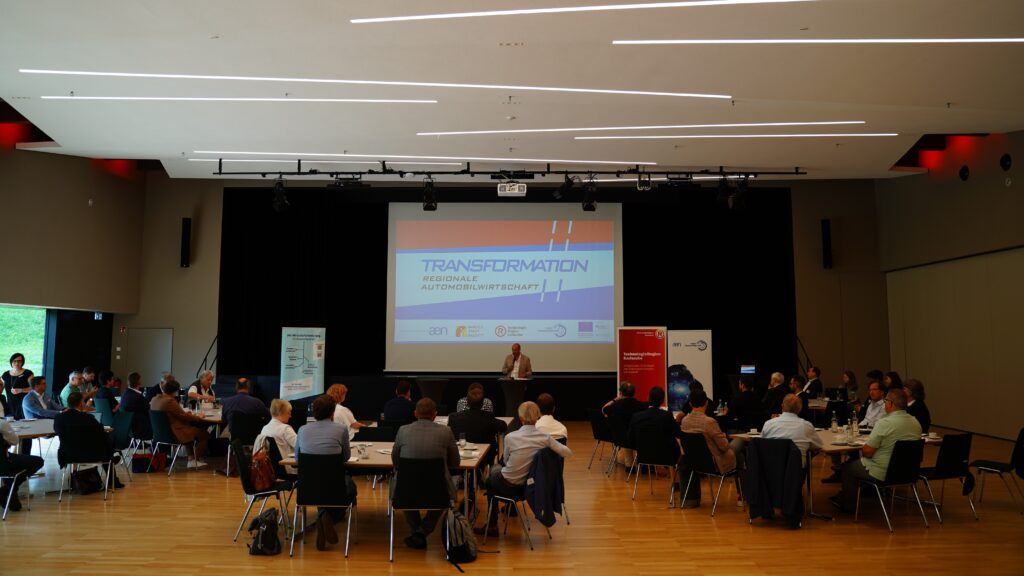
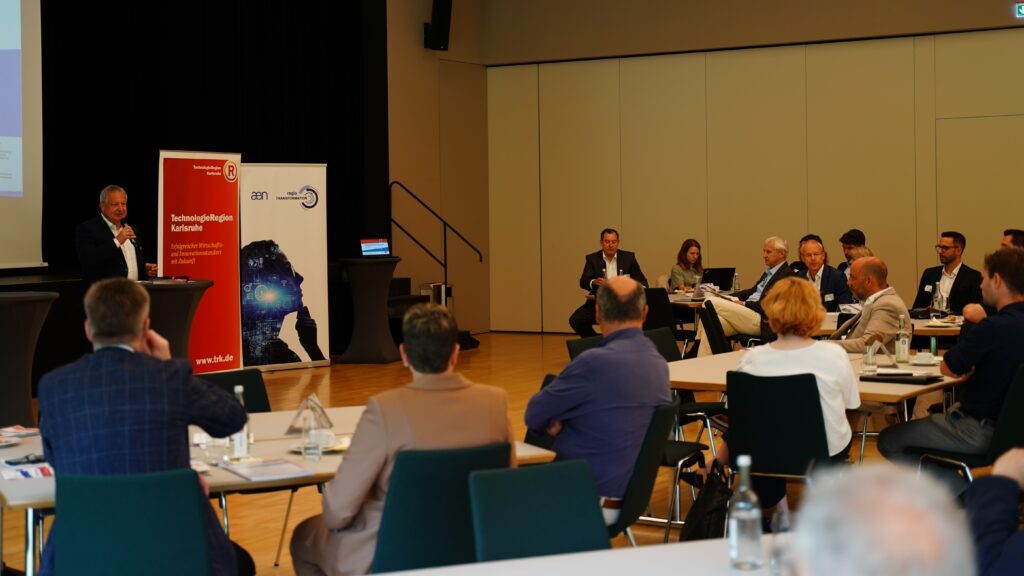
Students develop impressive ideas for the mobile future
Date of publication:
June 28, 2024
First presentation of the NEW:MOBILITY Award in Bruchsal
The winners of the NEW:MOBILITY Award 2024 have been announced. The competition for school students was held for the first time in the 2023/2024 school year. It was organized by the Bruchsal Regional Economic Development Agency (WFG) and the EfeuCampus Bruchsal, under the patronage of Oliver Luksic, State Secretary at the Federal Ministry of Transport. The seven student teams that made it to the final were presented with their awards at a ceremony on June 28, 2024 at the EfeuCampus.
The NEW:MOBILITY Award promotes young talents and motivates them to develop innovative ideas for sustainable mobility. All secondary schools in the Bruchsal region were able to take part. The teams of pupils have developed business ideas over the past few months and have now presented them in the form of videos and posters. SEW-EURODRIVE, Volocopter, Stadtwerke Bruchsal, KIT and other regional companies were on hand to support them, for example in the creation of prototypes.
The placings:
1st place (shared): Project "Moby Müll" - HLA Bruchsal
Project "Wall-E" - HLA Bruchsal
2nd place: "Hover Shoe" project - Pestalozzi School Graben-Neudorf
3rd place (shared): Project "Friday Eye" - HLA Bruchsal
Project "e-Baby" - HLA Bruchsal
4th place (shared): Project "Drone IT" - HLA Bruchsal
Project "H2Go" - HLA Bruchsal
The award ceremony took place in the presence of the participating schools, partner companies and interested members of the public at Campus 22, a real-world laboratory for autonomous driving in the former dragoon barracks in Bruchsal. In addition to the prize money, the winners were given the opportunity to present their projects in an exhibition on the EfeuCampus.
Enthusiasm among jury, patron and organizers
"Promoting innovative ideas from young people is essential for the development of sustainable mobility solutions. Bruchsal is an impressive example of how commitment and creativity can lead to pioneering projects," emphasized Oliver Luksic, State Secretary at the Federal Ministry of Transport, who is the patron of the award, in his video message to the guests.
Thomas Anderer, Managing Director of EfeuCampus Bruchsal GmbH, added in his welcoming address: "It is inspiring to see how committed and visionary the students are in their approach to the challenges of tomorrow's mobility." The projects submitted are an important impetus for the sustainable development of our region. In order to shape the future, it is fundamental to involve young people, a factor to which the Last Mile City Lab Bruchsal always pays particular attention.
"The NEW:MOBILITY Award shows very impressively how much innovative power and creativity our young people have," says WFG Managing Director Stefan Huber. "The support of the companies has confronted the barrier-free future thinking of the student teams with the experiences and requirements of the economy and contributed significantly to even better results." For the WFG, the award is a further building block in the "Springboard Training" initiative, which enables young people to come into contact with technology and companies while still at school and find out about career opportunities in the region.
It will continue in the next school year!
The NEW:MOBILITY Award will also be presented in the coming school year 2024/2025. Schools from the Bruchsal region can apply from mid-July and submit their innovative ideas. This once again offers the opportunity to present and further develop creative and forward-looking projects. The first schools have already expressed their interest in taking part in the next award with their own ideas.
Wirtschaftsförderung Region Bruchsal GmbH and EfeuCampus Bruchsal GmbH thanked all participating schools and partners for their commitment and look forward to continuing this successful competition in the coming year.
Further information: NEW:MOBILITY Award
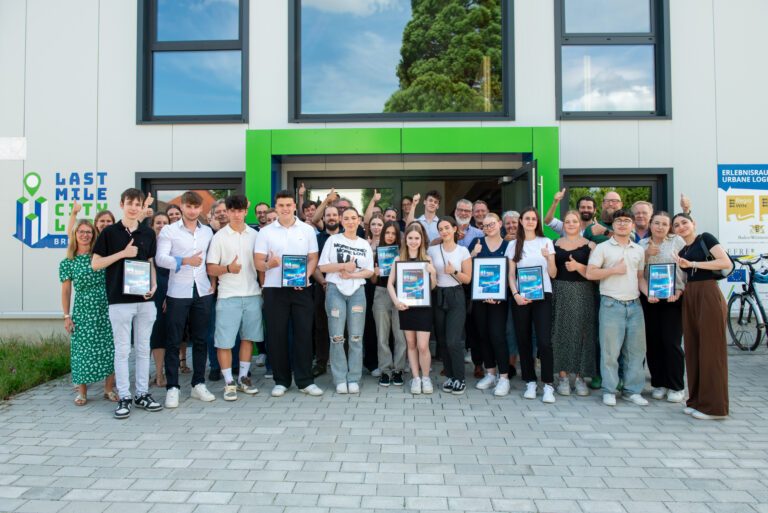
European School and Welcome Center work together
Date of publication:
June 24, 2024
Ceremonial signing of a cooperation agreement between the European School Karlsruhe and the Welcome Center TechnologieRegion Karlsruhe
The European School Karlsruhe (ESK) and the Welcome Center TechnologieRegion Karlsruhe (TRK) signed a cooperation agreement on Sunday, June 23, 2024. Daniel Gassner, Director of the European School Karlsruhe, and Jochen Ehlgötz, Managing Director of TechnologieRegion Karlsruhe GmbH, signed the agreement, which aims to bring international families and skilled workers closer to the Karlsruhe TechnologyRegion and promote social and cultural integration. The signing took place in the presence of Dr. Frank Mentrup, Lord Mayor of the City of Karlsruhe and Chairman of the Supervisory Board of TRK GmbH, as part of ESK's annual summer party. In his welcoming address, Dr. Mentrup emphasized the importance of this collaboration for the region: "The European School and the Welcome Center are key institutions that significantly increase the attractiveness of our region for international skilled workers and their families. This collaboration underlines our commitment to continuously strengthening the welcoming culture at TRK ."
Daniel Gassner, Director of the European School Karlsruhe, emphasized: "The future cooperation with the Welcome Center TRK represents an important contribution to the networking of the school - regionally and internationally. Newly arrived families can easily contact the Welcome Center and get to know the region."
"The cooperation with this educational institution, which is unique in the TRK region and which itself employs numerous skilled workers from Europe and around the world, demonstrates the importance of soft location factors for attracting international skilled workers. We want to attract skilled workers from abroad and their families to the region and invite them to stay - in line with our slogan " High-tech meets lifestyle", says Jochen Ehlgötz.
Petra Bender, Head of the Welcome Center TRK, emphasized on stage: "We are very much looking forward to addressing the international teachers and parents of the ESK with our offers in order to facilitate their arrival and accelerate their integration. For example, with individual consultations on topics such as family reunification or career prospects at TRK through to cultural events such as joint visits to the theater."
The cooperation agreement also includes access for international specialists to the "Welcome Guides" tandem program and the monthly "International Come Together" meetings, which promote exchange and new contacts.
In addition, the Welcome Center will communicate the European School as a possible school location and workplace for parents in consultations with international families and promote networking between the school and local partners. An annual presentation of the Welcome Center TRK at the European School Karlsruhe is also planned.
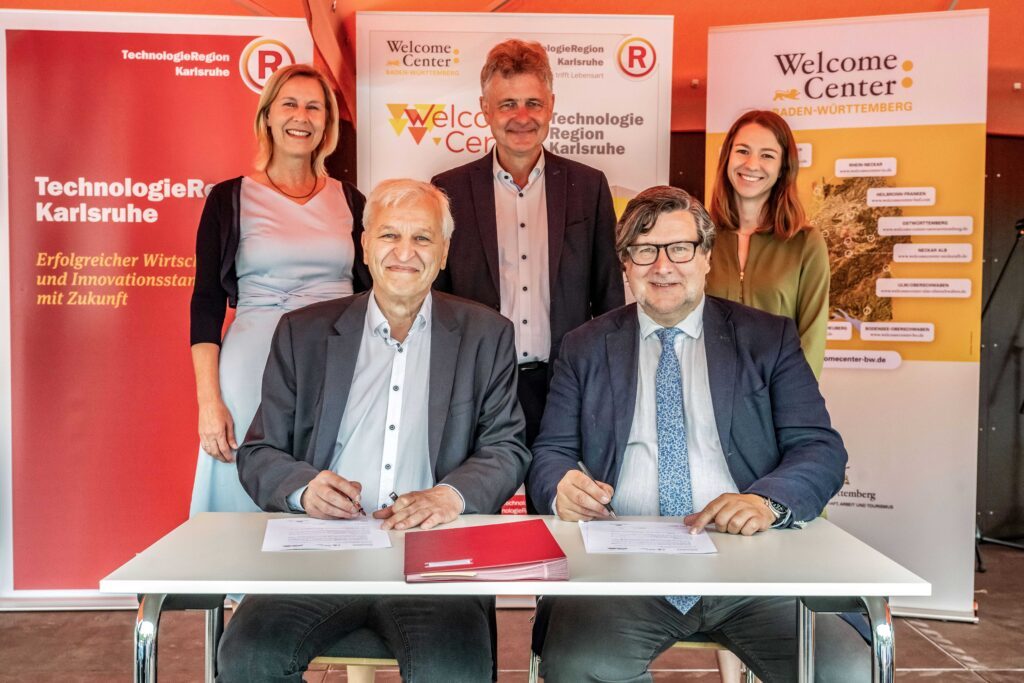
Baden-Baden and the district of Rastatt become a MINT cluster
More than 20 learning locations are being set up and equipped
Date of publication:
June 11, 2024
The EleMINT project, supported by CyberForum e.V., the city of Baden-Baden and Ohlebusch gGmbH, aims to make STEM education accessible to children and young people throughout Baden-Baden and the district of Rastatt by the end of 2026. The project, which is funded by the Federal Ministry of Education and Research, thus makes an important contribution to teaching young people future skills.
The EleMINT project is based on the successful concept of the "technika | Karlsruher Technik-Initiative" and relies on the use of technical toys such as fischertechnik to teach STEM subjects. Since 2013, more than 10,000 children and young people between the ages of eight and 16 have been introduced to STEM topics in a playful way at over 150 learning locations equipped with fischertechnik and have become enthusiastic about technology and computer science.
STEM education for all
The different requirements of children and young people are taken into account and their intrinsic motivation for STEM subjects is encouraged at both school and extracurricular educational venues as well as at special education and advice centers. In vacation programs, workshops and events, they will not only acquire technical knowledge and social skills, but also experience self-efficacy - true to the motto: Discover - Understand - Shape the future.
Further information: www.mint-festival-karlsruhe.de
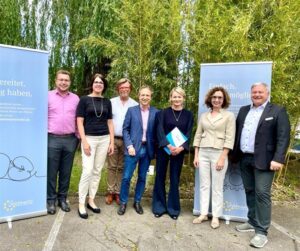
The raw materials turnaround can come
Presentation of the bioeconomy strategy for the Karlsruhe TechnologyRegion.
Date of publication:
May 06, 2024
The Karlsruhe TechnologyRegion (TRK) presented its RE²source bioeconomy strategy on April 22, 2024. More than 90 guests attended the event at the Karlsruhe Chamber of Industry and Commerce, demonstrating the great interest in the topic.
Dr. Andre Baumann, State Secretary at the Baden-Württemberg Ministry of the Environment, Climate Protection and the Energy Sector, emphasized the growing importance of the bioeconomy for Baden-Württemberg in his welcoming address and stressed: "With increasing urbanization, we are faced with the challenge of organizing material flows, using them efficiently and recycling raw materials. We therefore expect the scaling up of biotechnological processes for the recycling of residual materials and the expansion of corresponding infrastructures to be a priority and an important economic sector for ensuring sustainable prosperity. Being able to observe this future trend in the Karlsruhe TechnologyRegion today is a very positive sign."
In his keynote speech, Dr. Roland Breves, Chairman of the Board of the Cluster Industrial Biotechnology (CLIB e.V.), highlighted the potential and dynamics of the bioeconomy and emphasized the importance of cooperative collaboration between different players: "The circular bioeconomy offers the opportunity to achieve economic success through new alliances and business models. The connection between our cluster and the TRK stakeholder network creates opportunities for the mutual development of expertise, from which stakeholders across the entire value creation network benefit."
The bioeconomy strategy was presented by representatives of TechnologieRegion Karlsruhe GmbH (TRK GmbH), the Fraunhofer Institute for Systems and Innovation Research (ISI) and the Fraunhofer Institute for Interfacial Engineering and Biotechnology (IGB). It became clear that the intensive cooperation of the past twelve months with stakeholders from local authorities, industry and science will continue to be the key to success.
Lenz Sulzer from TechnologieRegion Karlsruhe GmbH summarized the goals of the strategy process and emphasized the importance of innovation transfer for the region: "The Karlsruhe TechnologyRegion can provide the solutions needed for the raw materials transition in a future-oriented economy. One focus of our work will be to show clear examples of the use of renewable resources and the recycling of residual materials through new biotechnical and chemical processes with demonstrators and to create contact points so that companies in the region can make even better use of the opportunities offered by this structural change."
The fact that the bioeconomy is already successfully finding its way into TRK in many facets was demonstrated by various specific practical examples: Alpha-Protein GmbH from Bruchsal, Stadtwerke Ettlingen GmbH, Team Sauberes Karlsruhe and EnergyLab 2.0 from the Karlsruhe Institute of Technology (KIT ) presented their approaches and experiences from projects in the field of the bioeconomy. And it really is everywhere - even where you first think of completely different topics - for example at SEW-Eurodrive GmbH & Co. KG from Bruchsal.
Katrin Alt from SEW-Eurodrive's development department explains: "We synthesize the base oil for our 'GearFluid Poly by SEW-Eurodrive' from sustainable biomass. TheCO2 value of the base oil is 84% lower than that of conventional polyglycol lubricants. We are thus making an important contribution to reducing the use of fossil raw materials. Compared to conventional bio-oils, GearFluid Poly also enables a 300% longer service life and maximum energy efficiency of our drives."
As a region of innovation, the Karlsruhe TechnologyRegion can rightly claim to have established itself as a leading bioeconomy region. Among other things, it is one of the 29 model regions for industrial bioeconomy recognized by the Federal Ministry of Economics and Climate Protection (BMWK). Since last fall, it has been working together with over 20 partners from Germany in the BMWK project "TransBIB" to network and accelerate the transfer process to industry.
Presentation of the bioeconomy strategy for the Karlsruhe TechnologyRegion.
Date of publication:
May 06, 2024
The Karlsruhe TechnologyRegion (TRK) presented its RE²source bioeconomy strategy on April 22, 2024. More than 90 guests attended the event at the Karlsruhe Chamber of Industry and Commerce, demonstrating the great interest in the topic.
Dr. Andre Baumann, State Secretary at the Baden-Württemberg Ministry of the Environment, Climate Protection and the Energy Sector, emphasized the growing importance of the bioeconomy for Baden-Württemberg in his welcoming address and stressed: "With increasing urbanization, we are faced with the challenge of organizing material flows, using them efficiently and recycling raw materials. We therefore expect the scaling up of biotechnological processes for the recycling of residual materials and the expansion of corresponding infrastructures to be a priority and an important economic sector for ensuring sustainable prosperity. Being able to observe this future trend in the Karlsruhe TechnologyRegion today is a very positive sign."
In his keynote speech, Dr. Roland Breves, Chairman of the Board of the Cluster Industrial Biotechnology (CLIB e.V.), highlighted the potential and dynamics of the bioeconomy and emphasized the importance of cooperative collaboration between different players: "The circular bioeconomy offers the opportunity to achieve economic success through new alliances and business models. The connection between our cluster and the TRK stakeholder network creates opportunities for the mutual development of expertise, from which stakeholders across the entire value creation network benefit."
The bioeconomy strategy was presented by representatives of TechnologieRegion Karlsruhe GmbH (TRK GmbH), the Fraunhofer Institute for Systems and Innovation Research (ISI) and the Fraunhofer Institute for Interfacial Engineering and Biotechnology (IGB). It became clear that the intensive cooperation of the past twelve months with stakeholders from local authorities, industry and science will continue to be the key to success.
Lenz Sulzer from TechnologieRegion Karlsruhe GmbH summarized the goals of the strategy process and emphasized the importance of innovation transfer for the region: "The Karlsruhe TechnologyRegion can provide the solutions needed for the raw materials transition in a future-oriented economy. One focus of our work will be to show clear examples of the use of renewable resources and the recycling of residual materials through new biotechnical and chemical processes with demonstrators and to create contact points so that companies in the region can make even better use of the opportunities offered by this structural change."
The fact that the bioeconomy is already successfully finding its way into TRK in many facets was demonstrated by various specific practical examples: Alpha-Protein GmbH from Bruchsal, Stadtwerke Ettlingen GmbH, Team Sauberes Karlsruhe and EnergyLab 2.0 from the Karlsruhe Institute of Technology (KIT ) presented their approaches and experiences from projects in the field of the bioeconomy. And it really is everywhere - even where you first think of completely different topics - for example at SEW-Eurodrive GmbH & Co. KG from Bruchsal.
Katrin Alt from SEW-Eurodrive's development department explains: "We synthesize the base oil for our 'GearFluid Poly by SEW-Eurodrive' from sustainable biomass. TheCO2 value of the base oil is 84% lower than that of conventional polyglycol lubricants. We are thus making an important contribution to reducing the use of fossil raw materials. Compared to conventional bio-oils, GearFluid Poly also enables a 300% longer service life and maximum energy efficiency of our drives."
As a region of innovation, the Karlsruhe TechnologyRegion can rightly claim to have established itself as a leading bioeconomy region. Among other things, it is one of the 29 model regions for industrial bioeconomy recognized by the Federal Ministry of Economics and Climate Protection (BMWK). Since last fall, it has been working together with over 20 partners from Germany in the BMWK project "TransBIB" to network and accelerate the transfer process to industry.
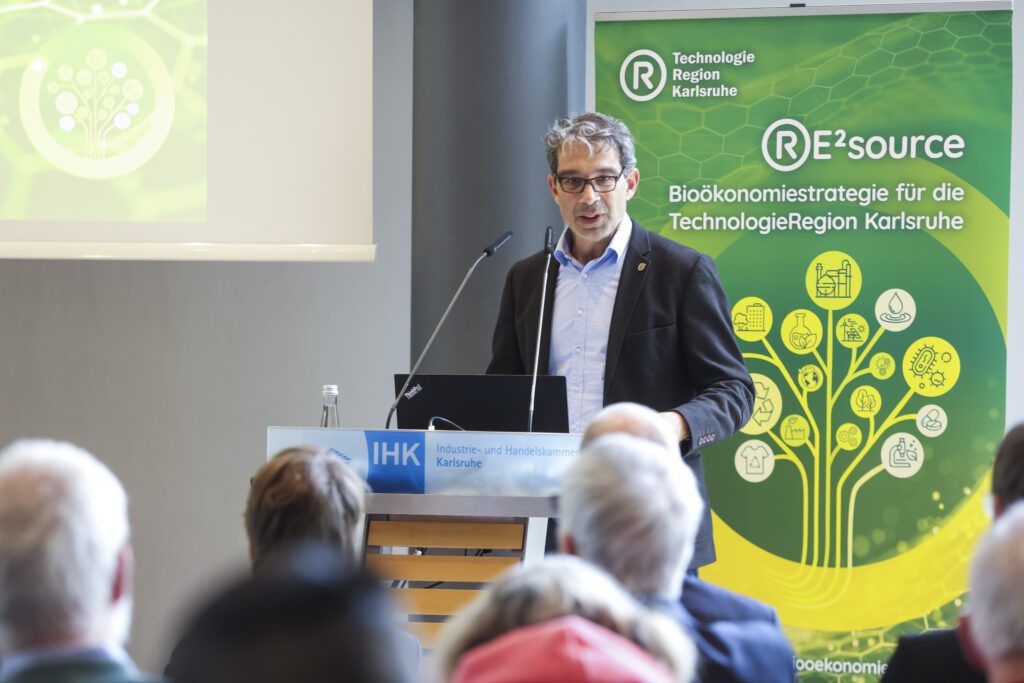
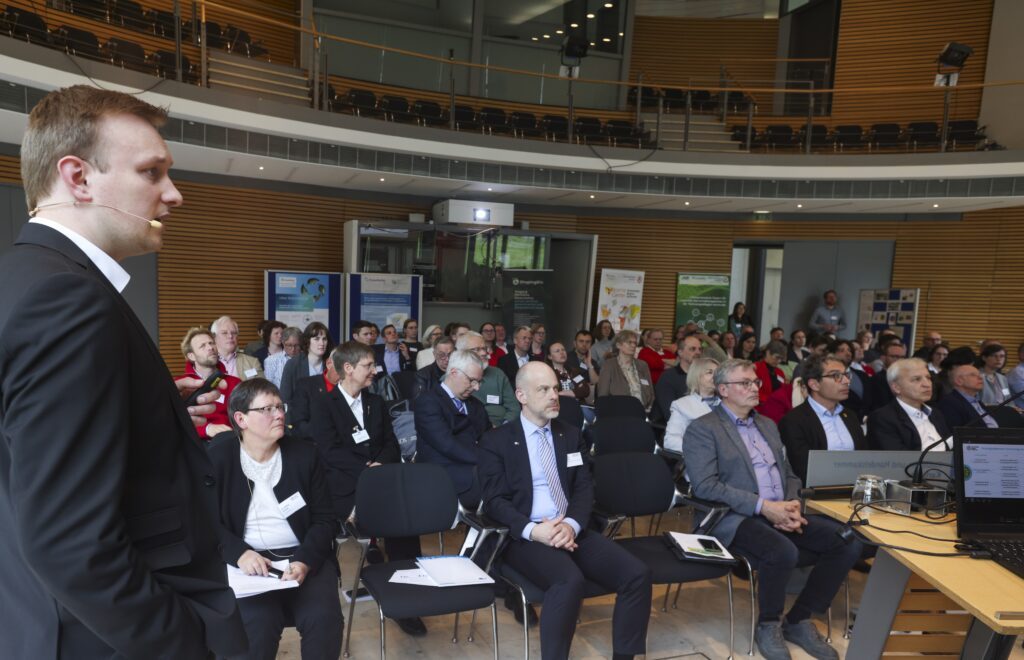
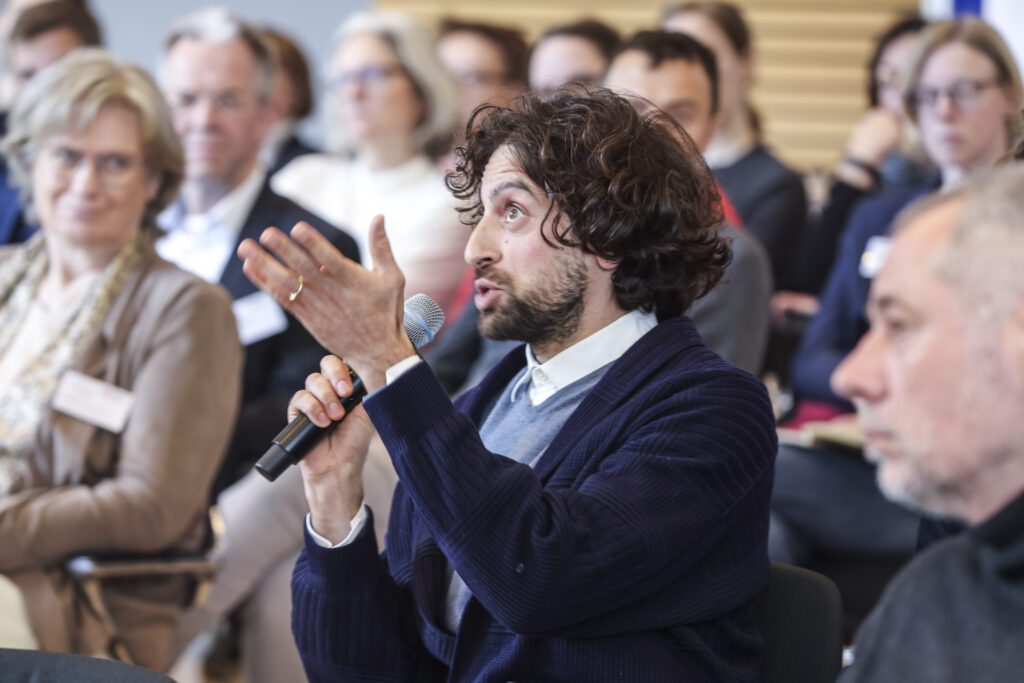
Center for future-oriented mobility development
The Karlsruhe Mobility Lab will be exhibiting from May 14 to 16, 2024 at the IT-TRANS at the Karlsruhe Trade Fair Center
Date of publication:
April 23, 2024
Once again, the region's mobility players are pooling their expertise in the Karlsruhe Mobility Lab and presenting themselves together at IT-TRANS - International Conference and Trade Fair, which will take place at Messe Karlsruhe from May 14 to 16, 2024. At the joint stand, the Lab's partners will present their projects - from ways to improve transport connections between urban and rural areas to on-demand transport and autonomous driving. In addition to an extensive lecture program directly at the stand, testing, touching and trying out will also be on the agenda for three days. Partners of the Karlsruhe Mobility Lab include KIT, KAMO: Karlsruhe Mobility High Performance Center, the FZI Research Center for Information Technology and the German Center for Future Mobility.
The Karlsruhe Mobility Lab of the Karlsruhe TechnologyRegion (TRK ) stands for a unique ecosystem in which science, business, the public sector and innovative transport companies work hand in hand. Together, they develop interdisciplinary solutions for the mobile world of tomorrow. These are put into practice, analyzed and tested with citizens. Thanks to its partners, the lab is a globally recognized center for the development of intelligent concepts for the urban and regional mobility of the future. "A key focus of the Karlsruhe Mobility Lab is on the further development of local public transport and the development of completely new mobility concepts," explains Jochen Ehlgötz, Managing Director of TechnologieRegion Karlsruhe GmbH. "In this way, researchers from the region are making a significant contribution to the mobility revolution worldwide. The Karlsruhe Mobility and TechnologyRegion can rightly call itself a pioneer in terms of sustainable mobility development."
Britta Wirtz, Managing Director of Messe Karlsruhe, is also convinced of the importance of the project: "The future of mobility is being shaped in the Karlsruhe Mobility Lab - and we are delighted that this creative think tank of our Karlsruhe players is once again presenting its innovative strength with a stand at IT-TRANS. The transport revolution can only succeed if business, science and the public sector pull together. This is exemplified here in Karlsruhe - the result is exciting projects that can take mobility to the next level."
At the joint stand (Y3/dm arena), the Karlsruhe Mobility Lab will be presenting future-oriented mobility concepts and initiatives that promote them over three days:
- The German Center for Mobility of the Future (DZM), an association of Karlsruhe, Hamburg, Minden and Annaberg-Buchholz in the field of mobility, presents lighthouse projects such as on-demand shuttle services and two-way vehicles for rail.
- The Innovation Campus Mobility of the Future (ICM) demonstrates how cloud technology can be used to implement scalable solutions and improved functionalities for connected vehicles and optimize their operation in terms of energy efficiency.
- The KAMO: Karlsruhe Mobility High Performance Center presents example projects on autonomous driving, intermodal transportation and sustainable mobility. These include the lighthouse project "Country-2-City" Bridge, which is researching sustainable and attractive transport options between urban and rural areas as part of the DZM.
- The FZI Research Center for Information Technology uses the example of smart bus stops to show how existing urban infrastructure can support the operation of automated shuttles. Both the bus stop and the vehicle are equipped with sensors whose data is used by artificial intelligence not only to increase the safety of road users, but also to increase the scalability of automated and networked vehicles in the traffic environment.
- The aim of regioKArgo is to develop a sustainable, holistic logistics concept for the Karlsruhe region. The LogIKTram, URBANE and regioKArgoTramTrain projects will be presented at the stand and are set to go into regular operation.
- The joint mobility portal of the Karlsruhe TechnologyRegion and the City of Karlsruhe offers comprehensive information on mobility issues in Baden, the Southern Palatinate and Northern Alsace. The platform provides free and mostly real-time data on motor vehicle and bicycle traffic, public transport and multimodal mobility.
A lecture forum with numerous exciting presentations and project insights will take place at the trade fair stand on all three days of the fair. For example, INIT will be presenting the research project "KARL - AI for Work and Learning in the Karlsruhe Region", which is funded by the Federal Ministry of Education and Research (BMBF) and in which a digital suggestion assistant for public transport control centers is being developed. The project is the central point of contact in the Karlsruhe region for questions relating to AI in the world of learning and work and brings together 17 project partners. They are all gathering insights into the design of the working world of tomorrow and testing them as models for explicit AI use cases. The complete lecture program can be viewed at www.trk.de/mobility.
The Karlsruhe Mobility Lab will also be presenting at an IT-TRANS Market Update Forum on Wednesday, May 15, 2024 from 11 a.m. to 12 noon. In the session "Improving public transport beyond city limits", the Lab will present current solution modules for integrative and seamless public transport of the future to trade fair visitors and conference participants.
The region enjoys recognition from politics and science due to its innovative climate. Well-known companies such as INIT and PTV are based here and successfully export mobility solutions "Made in TechnologieRegion Karlsruhe" all over the world. It is home to important institutions such as the Baden-Württemberg Institute for Sustainable Mobility and a site of the German Center for Future Mobility (DZM). As a university and research location, the Karlsruhe TechnologyRegion is characterized by a high density of research projects and institutions in the field of mobility. "With our interdisciplinary applied research and the Karlsruhe Mobility Lab ecosystem, we want to help shape the mobility of the future," says Dr. Miriam Ruf from Fraunhofer ICT and head of the KAMO office. The KAMO: Karlsruhe Mobility High Performance Center is an association of the Karlsruhe institutions for research, teaching and transfer (FZI Research Center for Information Technology, Karlsruhe Institute of Technology (KIT), Karlsruhe University of Applied Sciences and the four Karlsruhe Fraunhofer Institutes ICT, IOSB, ISI, IWM), which develop innovative, interdisciplinary mobility solutions together with partners from industry, society and the public sector.
The Managing Director of the KIT Center for Mobility Systems, Dipl.-Ing. Eva-Maria Knoch, also sees the region as a hotspot for pioneering concepts for the mobility of the future and is looking forward to IT-TRANS: "We focus on mobility solutions based on the idea of networked mobility along mobility chains. As a partner of the Karlsruhe Mobility Lab, we will be presenting our research into future public transport systems with a particular focus on user acceptance and look forward to stimulating discussions."
Partners of the Karlsruhe Mobility Lab at IT-TRANS 2024 are the major mobility players in the region.
In addition to TechnologieRegion Karlsruhe GmbH, these are: Automotive Engineering Network e.V. (AEN), German Center for Future Mobility (DZM), FZI Research Center for Information Technology, INIT Group, Karlsruhe Institute of Technology (KIT) with the Innovation Campus Mobility of the Future (ICM), the KAMO: Karlsruhe Mobility High Performance Center and the KIT Center for Mobility Systems, Karlsruher Verkehrsverbund (KVV) with Albtal-Verkehrs-Gesellschaft mbH (AVG) and Verkehrsbetriebe Karlsruhe (VBK), Messe Karlsruhe, PTV Planung Transport Verkehr GmbH, Tiefbauamt der Stadt Karlsruhe, TransportTechnologie-Consult Karlsruhe GmbH (TTK) and UITP Regional Training Centre Karlsruhe.
IT-TRANS - International Conference and Trade Fair
IT-TRANS is the leading international trade fair and conference specializing in digitalization and intelligent solutions for public transport. The event in Karlsruhe is the central industry meeting point for everyone involved in public transport: Focus topics include AI, payment and ticketing, cybersecurity, data governance and much more. IT-TRANS has been organized in cooperation with UITP - The International Association of Public Transport and Messe Karlsruhe since 2008. IT-TRANS will take place from May 14 to 16, 2024 at Messe Karlsruhe, Germany.
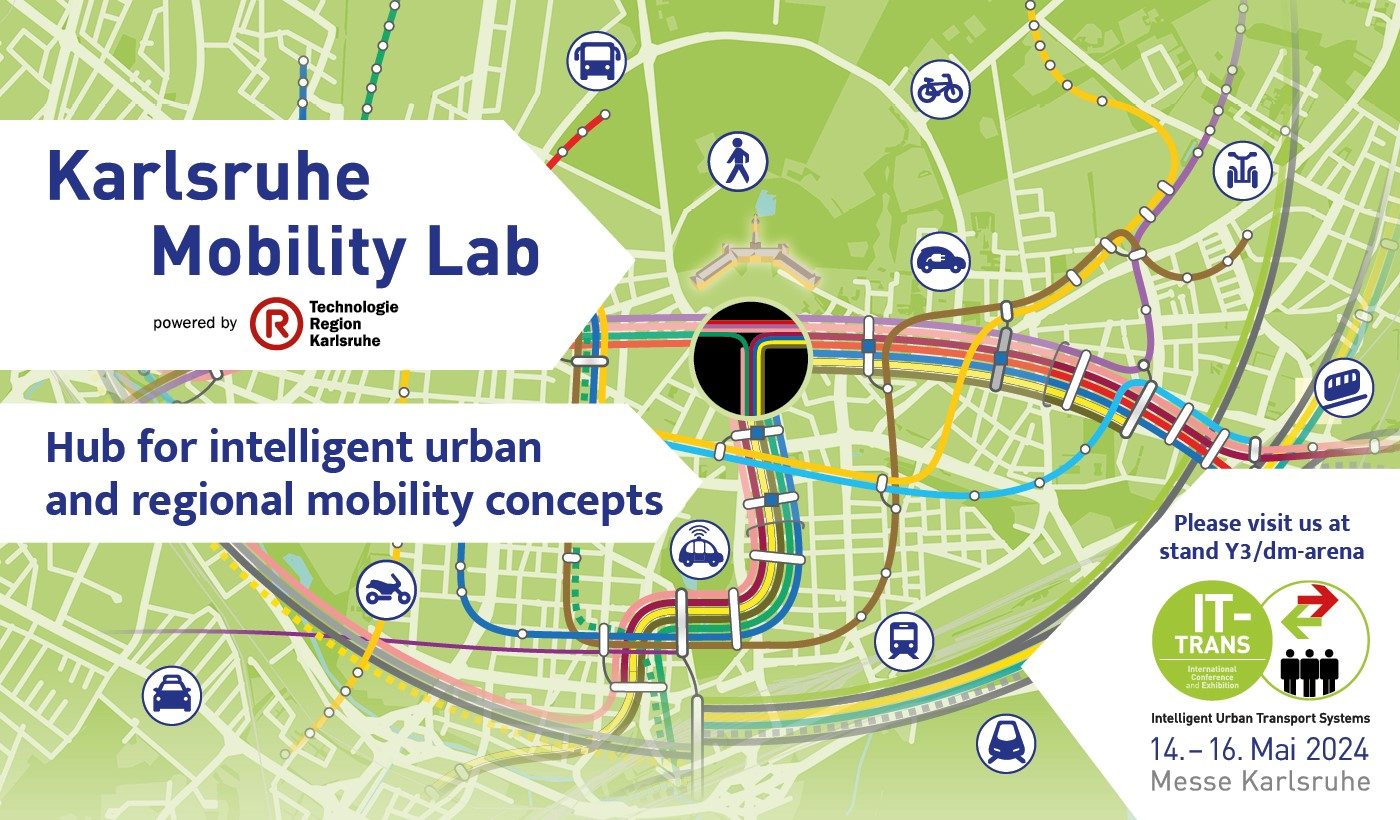
NEO2024 Innovation Award: Karlsruhe TechnologyRegion seeks pioneering solutions in the circular economy
Submission deadline until June 4
Date of publication:
April 9, 2024
This year's Innovation Award of the Karlsruhe TechnologyRegion is all about the circular economy. In view of pressing global challenges such as climate change, energy transition, sustainability and resource scarcity, the promotion of innovative approaches to closing product and raw material cycles is of crucial importance. These solutions play a key role in making the economy more sustainable and in competing internationally.
"Activities that contribute to avoiding waste and improving efficiency in the use of resources can be worthy of an award. This can include reducing material consumption, extending product life, recycling and reusing products and materials," explains Jochen Ehlgötz, Managing Director of TechnologieRegion Karlsruhe GmbH.
The NEO Innovation Prize is awarded both nationally and across borders in Alsace, France. Companies, start-ups, research institutions and individuals are invited to submit their pioneering ideas and projects that contribute to the development and implementation of the circular economy.
"Companies today are faced with the challenge of not only being economically successful, but also taking responsibility for our environment. The circular economy is not a trend, but a necessity. It is an opportunity for companies to promote innovation and at the same time make a positive contribution to our world," emphasizes Dr. Frank Mentrup, Chairman of the Supervisory Board of TechnologieRegion Karlsruhe GmbH and Lord Mayor of the City of Karlsruhe.
The competition takes place in two stages: Participants apply by June 4, 2024 with a brief description in German or English via the TRK website. A high-caliber expert jury with representatives from science, business and politics will make a pre-selection and request further elaborations from a maximum of ten projects. From these, it then nominates up to five submissions for the award ceremony. The finalists present their ideas to the audience on the day of the award ceremony before the NEO2024 winners are announced. In addition to the jury prize of 20,000 euros, an audience award donated by Nussbaum Medien will once again be presented. The award ceremony will take place on December 5 in the Karlsruhe TechnologyRegion.
Further information on the application and the conditions of participation can be found at trk.de/neo2024
49th meeting of the Regional Conference of the Karlsruhe TechnologyRegion
The future of culture - dialog at eye level
Date of publication:
April 5, 2024
When culture and business come together, it's not just about money and sponsorship per se. This was made abundantly clear at the 49th meeting of the Karlsruhe TechnologyRegion's regional conference. Rather, cooperation at eye level was the wish of all participants.
"We wanted to create something new within the regional conference with the format of a discussion round with the most important cultural players in the region," explains its Chairman and IHK President Wolfgang Grenke. "We offered a platform in the IHK Haus der Wirtschaft to network the worlds. We should realize that we have an exceptional cultural landscape by international standards, which is far too often taken for granted." Everyone agreed that culture means quality of life. "It is also an important location factor. If we want to keep people in our region or attract them to our region, this is an asset that we can use to our advantage. In the competition between regions, our exceptional range of cultural facilities and events is a clear unique selling point. It is not without reason that the Karlsruhe TechnologyRegion has the slogan "High-tech meets lifestyle", because culture in its many forms is an important location factor, also from an economic point of view. This will play an increasingly important role, especially against the background of the shortage of skilled workers." In this context, Grenke highlighted the cooperation between the Welcome Center of the TechnologyRegion (TRK) and the Badisches Staatstheater.
Karlsruhe's Lord Mayor Dr. Frank Mentrup also emphasized: "With the start of new eras in some venues, we are looking forward to exciting times in our regional cultural scene, which may even have an impact on the whole country. Everyone involved is aware that cultural institutions are increasingly becoming places of discussion that must also be attractive to the younger generations."
Wolf E. Rahlfs, artistic director of the Badische Landesbühne Bruchsal, wants the aforementioned dialog at eye level. "We are not supplicants," explains the former actor and director firmly. Johannes Graf-Hauber, Director of the Badisches Staatstheater Karlsruhe, takes a similar view. "We seek out and use collaborations with the business world. For example, in the area of 3D printing for our stage sets. Or, with regard to the TRK hydrogen offensive, I ask myself the question: why can't we as a theater test a hydrogen truck for our fleet?" Efficient and sustainable theater renovation would also be impossible without cooperation with the private sector.
Incidentally, sustainability is also a topic close to the heart of Nicola May, director of the Stadttheater Baden-Baden. Her wish for the region in response to the question posed by moderator Dr. Volkmar Baumgärtner, Managing Director of KulturRegion Karlsruhe: better public transport connections to the theater. Not least in terms of sustainability. She also made it clear that theater is timeless and (almost) crisis-proof. Ultimately, it only needs one person on stage and one person in the audience. An art of the moment.
A second important topic came into play here: for May and Rahlfs, theater and culture are above all analog, not in the sense of opposing digital, but as places of encounter between people in the audience or, ideally, with the people on stage. Perhaps also as places of encounter in the middle of the city. Prof. Dr. Frédéric Bußmann, Director of the Kunsthalle Karlsruhe, for example, has to make a virtue out of necessity. Baumgärtner calls it closed but open. "We are a nomadic museum," explains Bußmann, "dependent on cooperation, for example with the ZKM, which has given the exhibitions a new home, a strategy for the future born out of necessity. This shows that a museum is more than just a place. Here, too, there are opportunities for cooperation with industry, namely in partnership for a sustainable expansion of the Kunsthalle.
Prof. Dr. Eckart Köhne, Director of the Baden State Museum, whose home, Karlsruhe Palace, is to be renovated from autumn 2025, is facing a similar situation. He is hoping for asylum in the city center. "After all, culture is an important location factor for tourism and a component of a liveable city center."
Alistair Hudson, who has been director of the ZKM for one year and two days, wants to lead the museum into its third era, into the "Post-Digital Bauhaus" chapter. How could it be otherwise, the Englishman is focusing on international digital collaborations that make time and space unimportant and no longer direct the focus of the cultural world exclusively on the world's cultural capitals. Karlsruhe can also score points here with extraordinary innovations, not least thanks to the cooperation between culture, business and technology.
All those involved saw the subsidies for the cultural facilities as justified. "The investment in a society worth living in is definitely worth the money.
View into the TRK
Managing Director Jochen Ehlgötz provided the traditional look at the activities of TechnologieRegion Karlsruhe GmbH. As already mentioned, the region is focusing heavily on H2 hydrogen as a very important energy source for the region's future energy supply and as a contribution to CO2 neutrality. "We have enormous expertise in this area. Within our project, "Climate protection and value creation through hydrogen - KWH2", we want to show ways, define framework conditions and are planning an initial modeling by the H2iPortKAMod project consortium in the Rhine port."
In this context, Ehlgötz announces the Hydrogen Week from June 17 to 21, 2024 at the IHK Karlsruhe.
Other key topics at TRK include national and possibly international networking in the field of bioeconomy. Work is currently underway on a bioeconomy strategy for the region, which will be presented at the IHK on April 22. The NEO 2024 Innovation Award also deals with the topic of sustainability. It is looking for innovations in the circular economy.
Finally, the Baden-Baden Film and Series Festival was presented, which is considered one of the most important industry gatherings.
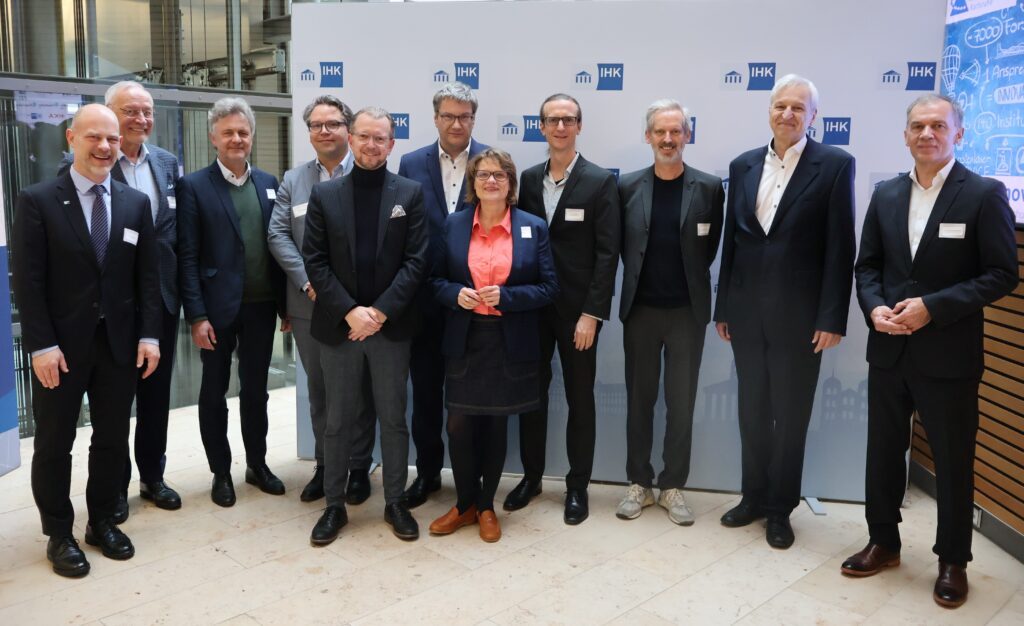
Second art prize awarded in the Karlsruhe TechnologyRegion
You have until April 26 to apply online for the 2nd Art Prize, which will be awarded in summer 2025
Date of publication:
March 25, 2024
Center for future-oriented mobility development
The Karlsruhe Mobility Lab will be exhibiting from May 14 to 16, 2024 at the IT-TRANS at the Karlsruhe Trade Fair Center
Date of publication:
April 23, 2024
Once again, the region's mobility players are pooling their expertise in the Karlsruhe Mobility Lab and presenting themselves together at IT-TRANS - International Conference and Trade Fair, which will take place at Messe Karlsruhe from May 14 to 16, 2024. At the joint stand, the Lab's partners will present their projects - from ways to improve transport connections between urban and rural areas to on-demand transport and autonomous driving. In addition to an extensive lecture program directly at the stand, testing, touching and trying out will also be on the agenda for three days. Partners of the Karlsruhe Mobility Lab include KIT, KAMO: Karlsruhe Mobility High Performance Center, the FZI Research Center for Information Technology and the German Center for Future Mobility.
The Karlsruhe Mobility Lab of the Karlsruhe TechnologyRegion (TRK ) stands for a unique ecosystem in which science, business, the public sector and innovative transport companies work hand in hand. Together, they develop interdisciplinary solutions for the mobile world of tomorrow. These are put into practice, analyzed and tested with citizens. Thanks to its partners, the lab is a globally recognized center for the development of intelligent concepts for the urban and regional mobility of the future. "A key focus of the Karlsruhe Mobility Lab is on the further development of local public transport and the development of completely new mobility concepts," explains Jochen Ehlgötz, Managing Director of TechnologieRegion Karlsruhe GmbH. "In this way, researchers from the region are making a significant contribution to the mobility revolution worldwide. The Karlsruhe Mobility and TechnologyRegion can rightly call itself a pioneer in terms of sustainable mobility development."
Britta Wirtz, Managing Director of Messe Karlsruhe, is also convinced of the importance of the project: "The future of mobility is being shaped in the Karlsruhe Mobility Lab - and we are delighted that this creative think tank of our Karlsruhe players is once again presenting its innovative strength with a stand at IT-TRANS. The transport revolution can only succeed if business, science and the public sector pull together. This is exemplified here in Karlsruhe - the result is exciting projects that can take mobility to the next level."
At the joint stand (Y3/dm arena), the Karlsruhe Mobility Lab will be presenting future-oriented mobility concepts and initiatives that promote them over three days:
- The German Center for Mobility of the Future (DZM), an association of Karlsruhe, Hamburg, Minden and Annaberg-Buchholz in the field of mobility, presents lighthouse projects such as on-demand shuttle services and two-way vehicles for rail.
- The Innovation Campus Mobility of the Future (ICM) demonstrates how cloud technology can be used to implement scalable solutions and improved functionalities for connected vehicles and optimize their operation in terms of energy efficiency.
- The KAMO: Karlsruhe Mobility High Performance Center presents example projects on autonomous driving, intermodal transportation and sustainable mobility. These include the lighthouse project "Country-2-City" Bridge, which is researching sustainable and attractive transport options between urban and rural areas as part of the DZM.
- The FZI Research Center for Information Technology uses the example of smart bus stops to show how existing urban infrastructure can support the operation of automated shuttles. Both the bus stop and the vehicle are equipped with sensors whose data is used by artificial intelligence not only to increase the safety of road users, but also to increase the scalability of automated and networked vehicles in the traffic environment.
- The aim of regioKArgo is to develop a sustainable, holistic logistics concept for the Karlsruhe region. The LogIKTram, URBANE and regioKArgoTramTrain projects will be presented at the stand and are set to go into regular operation.
- The joint mobility portal of the Karlsruhe TechnologyRegion and the City of Karlsruhe offers comprehensive information on mobility issues in Baden, the Southern Palatinate and Northern Alsace. The platform provides free and mostly real-time data on motor vehicle and bicycle traffic, public transport and multimodal mobility.
A lecture forum with numerous exciting presentations and project insights will take place at the trade fair stand on all three days of the fair. For example, INIT will be presenting the research project "KARL - AI for Work and Learning in the Karlsruhe Region", which is funded by the Federal Ministry of Education and Research (BMBF) and in which a digital suggestion assistant for public transport control centers is being developed. The project is the central point of contact in the Karlsruhe region for questions relating to AI in the world of learning and work and brings together 17 project partners. They are all gathering insights into the design of the working world of tomorrow and testing them as models for explicit AI use cases. The complete lecture program can be viewed at www.trk.de/mobility.
The Karlsruhe Mobility Lab will also be presenting at an IT-TRANS Market Update Forum on Wednesday, May 15, 2024 from 11 a.m. to 12 noon. In the session "Improving public transport beyond city limits", the Lab will present current solution modules for integrative and seamless public transport of the future to trade fair visitors and conference participants.
The region enjoys recognition from politics and science due to its innovative climate. Well-known companies such as INIT and PTV are based here and successfully export mobility solutions "Made in TechnologieRegion Karlsruhe" all over the world. It is home to important institutions such as the Baden-Württemberg Institute for Sustainable Mobility and a site of the German Center for Future Mobility (DZM). As a university and research location, the Karlsruhe TechnologyRegion is characterized by a high density of research projects and institutions in the field of mobility. "With our interdisciplinary applied research and the Karlsruhe Mobility Lab ecosystem, we want to help shape the mobility of the future," says Dr. Miriam Ruf from Fraunhofer ICT and head of the KAMO office. The KAMO: Karlsruhe Mobility High Performance Center is an association of the Karlsruhe institutions for research, teaching and transfer (FZI Research Center for Information Technology, Karlsruhe Institute of Technology (KIT), Karlsruhe University of Applied Sciences and the four Karlsruhe Fraunhofer Institutes ICT, IOSB, ISI, IWM), which develop innovative, interdisciplinary mobility solutions together with partners from industry, society and the public sector.
The Managing Director of the KIT Center for Mobility Systems, Dipl.-Ing. Eva-Maria Knoch, also sees the region as a hotspot for pioneering concepts for the mobility of the future and is looking forward to IT-TRANS: "We focus on mobility solutions based on the idea of networked mobility along mobility chains. As a partner of the Karlsruhe Mobility Lab, we will be presenting our research into future public transport systems with a particular focus on user acceptance and look forward to stimulating discussions."
Partners of the Karlsruhe Mobility Lab at IT-TRANS 2024 are the major mobility players in the region.
In addition to TechnologieRegion Karlsruhe GmbH, these are: Automotive Engineering Network e.V. (AEN), German Center for Future Mobility (DZM), FZI Research Center for Information Technology, INIT Group, Karlsruhe Institute of Technology (KIT) with the Innovation Campus Mobility of the Future (ICM), the KAMO: Karlsruhe Mobility High Performance Center and the KIT Center for Mobility Systems, Karlsruher Verkehrsverbund (KVV) with Albtal-Verkehrs-Gesellschaft mbH (AVG) and Verkehrsbetriebe Karlsruhe (VBK), Messe Karlsruhe, PTV Planung Transport Verkehr GmbH, Tiefbauamt der Stadt Karlsruhe, TransportTechnologie-Consult Karlsruhe GmbH (TTK) and UITP Regional Training Centre Karlsruhe.
IT-TRANS - International Conference and Trade Fair
IT-TRANS is the leading international trade fair and conference specializing in digitalization and intelligent solutions for public transport. The event in Karlsruhe is the central industry meeting point for everyone involved in public transport: Focus topics include AI, payment and ticketing, cybersecurity, data governance and much more. IT-TRANS has been organized in cooperation with UITP - The International Association of Public Transport and Messe Karlsruhe since 2008. IT-TRANS will take place from May 14 to 16, 2024 at Messe Karlsruhe, Germany.

NEO2024 Innovation Award: Karlsruhe TechnologyRegion seeks pioneering solutions in the circular economy
Submission deadline until June 4
Date of publication:
April 9, 2024
This year's Innovation Award of the Karlsruhe TechnologyRegion is all about the circular economy. In view of pressing global challenges such as climate change, energy transition, sustainability and resource scarcity, the promotion of innovative approaches to closing product and raw material cycles is of crucial importance. These solutions play a key role in making the economy more sustainable and in competing internationally.
"Activities that contribute to avoiding waste and improving efficiency in the use of resources can be worthy of an award. This can include reducing material consumption, extending product life, recycling and reusing products and materials," explains Jochen Ehlgötz, Managing Director of TechnologieRegion Karlsruhe GmbH.
The NEO Innovation Prize is awarded both nationally and across borders in Alsace, France. Companies, start-ups, research institutions and individuals are invited to submit their pioneering ideas and projects that contribute to the development and implementation of the circular economy.
"Companies today are faced with the challenge of not only being economically successful, but also taking responsibility for our environment. The circular economy is not a trend, but a necessity. It is an opportunity for companies to promote innovation and at the same time make a positive contribution to our world," emphasizes Dr. Frank Mentrup, Chairman of the Supervisory Board of TechnologieRegion Karlsruhe GmbH and Lord Mayor of the City of Karlsruhe.
The competition takes place in two stages: Participants apply by June 4, 2024 with a brief description in German or English via the TRK website. A high-caliber expert jury with representatives from science, business and politics will make a pre-selection and request further elaborations from a maximum of ten projects. From these, it then nominates up to five submissions for the award ceremony. The finalists present their ideas to the audience on the day of the award ceremony before the NEO2024 winners are announced. In addition to the jury prize of 20,000 euros, an audience award donated by Nussbaum Medien will once again be presented. The award ceremony will take place on December 5 in the Karlsruhe TechnologyRegion.
Further information on the application and the conditions of participation can be found at trk.de/neo2024
49th meeting of the Regional Conference of the Karlsruhe TechnologyRegion
The future of culture - dialog at eye level
Date of publication:
April 5, 2024
When culture and business come together, it's not just about money and sponsorship per se. This was made abundantly clear at the 49th meeting of the Karlsruhe TechnologyRegion's regional conference. Rather, cooperation at eye level was the wish of all participants.
"We wanted to create something new within the regional conference with the format of a discussion round with the most important cultural players in the region," explains its Chairman and IHK President Wolfgang Grenke. "We offered a platform in the IHK Haus der Wirtschaft to network the worlds. We should realize that we have an exceptional cultural landscape by international standards, which is far too often taken for granted." Everyone agreed that culture means quality of life. "It is also an important location factor. If we want to keep people in our region or attract them to our region, this is an asset that we can use to our advantage. In the competition between regions, our exceptional range of cultural facilities and events is a clear unique selling point. It is not without reason that the Karlsruhe TechnologyRegion has the slogan "High-tech meets lifestyle", because culture in its many forms is an important location factor, also from an economic point of view. This will play an increasingly important role, especially against the background of the shortage of skilled workers." In this context, Grenke highlighted the cooperation between the Welcome Center of the TechnologyRegion (TRK) and the Badisches Staatstheater.
Karlsruhe's Lord Mayor Dr. Frank Mentrup also emphasized: "With the start of new eras in some venues, we are looking forward to exciting times in our regional cultural scene, which may even have an impact on the whole country. Everyone involved is aware that cultural institutions are increasingly becoming places of discussion that must also be attractive to the younger generations."
Wolf E. Rahlfs, artistic director of the Badische Landesbühne Bruchsal, wants the aforementioned dialog at eye level. "We are not supplicants," explains the former actor and director firmly. Johannes Graf-Hauber, Director of the Badisches Staatstheater Karlsruhe, takes a similar view. "We seek out and use collaborations with the business world. For example, in the area of 3D printing for our stage sets. Or, with regard to the TRK hydrogen offensive, I ask myself the question: why can't we as a theater test a hydrogen truck for our fleet?" Efficient and sustainable theater renovation would also be impossible without cooperation with the private sector.
Incidentally, sustainability is also a topic close to the heart of Nicola May, director of the Stadttheater Baden-Baden. Her wish for the region in response to the question posed by moderator Dr. Volkmar Baumgärtner, Managing Director of KulturRegion Karlsruhe: better public transport connections to the theater. Not least in terms of sustainability. She also made it clear that theater is timeless and (almost) crisis-proof. Ultimately, it only needs one person on stage and one person in the audience. An art of the moment.
A second important topic came into play here: for May and Rahlfs, theater and culture are above all analog, not in the sense of opposing digital, but as places of encounter between people in the audience or, ideally, with the people on stage. Perhaps also as places of encounter in the middle of the city. Prof. Dr. Frédéric Bußmann, Director of the Kunsthalle Karlsruhe, for example, has to make a virtue out of necessity. Baumgärtner calls it closed but open. "We are a nomadic museum," explains Bußmann, "dependent on cooperation, for example with the ZKM, which has given the exhibitions a new home, a strategy for the future born out of necessity. This shows that a museum is more than just a place. Here, too, there are opportunities for cooperation with industry, namely in partnership for a sustainable expansion of the Kunsthalle.
Prof. Dr. Eckart Köhne, Director of the Baden State Museum, whose home, Karlsruhe Palace, is to be renovated from autumn 2025, is facing a similar situation. He is hoping for asylum in the city center. "After all, culture is an important location factor for tourism and a component of a liveable city center."
Alistair Hudson, who has been director of the ZKM for one year and two days, wants to lead the museum into its third era, into the "Post-Digital Bauhaus" chapter. How could it be otherwise, the Englishman is focusing on international digital collaborations that make time and space unimportant and no longer direct the focus of the cultural world exclusively on the world's cultural capitals. Karlsruhe can also score points here with extraordinary innovations, not least thanks to the cooperation between culture, business and technology.
All those involved saw the subsidies for the cultural facilities as justified. "The investment in a society worth living in is definitely worth the money.
View into the TRK
Managing Director Jochen Ehlgötz provided the traditional look at the activities of TechnologieRegion Karlsruhe GmbH. As already mentioned, the region is focusing heavily on H2 hydrogen as a very important energy source for the region's future energy supply and as a contribution to CO2 neutrality. "We have enormous expertise in this area. Within our project, "Climate protection and value creation through hydrogen - KWH2", we want to show ways, define framework conditions and are planning an initial modeling by the H2iPortKAMod project consortium in the Rhine port."
In this context, Ehlgötz announces the Hydrogen Week from June 17 to 21, 2024 at the IHK Karlsruhe.
Other key topics at TRK include national and possibly international networking in the field of bioeconomy. Work is currently underway on a bioeconomy strategy for the region, which will be presented at the IHK on April 22. The NEO 2024 Innovation Award also deals with the topic of sustainability. It is looking for innovations in the circular economy.
Finally, the Baden-Baden Film and Series Festival was presented, which is considered one of the most important industry gatherings.

Second art prize awarded in the Karlsruhe TechnologyRegion
You have until April 26 to apply online for the 2nd Art Prize, which will be awarded in summer 2025
Date of publication:
March 25, 2024
Public transportation: Efficient services for commuting between urban and rural areas
The German Center for Future Mobility is launching a site project in Karlsruhe to improve transport links between the city and the surrounding area
Date of publication:
March 8, 2024
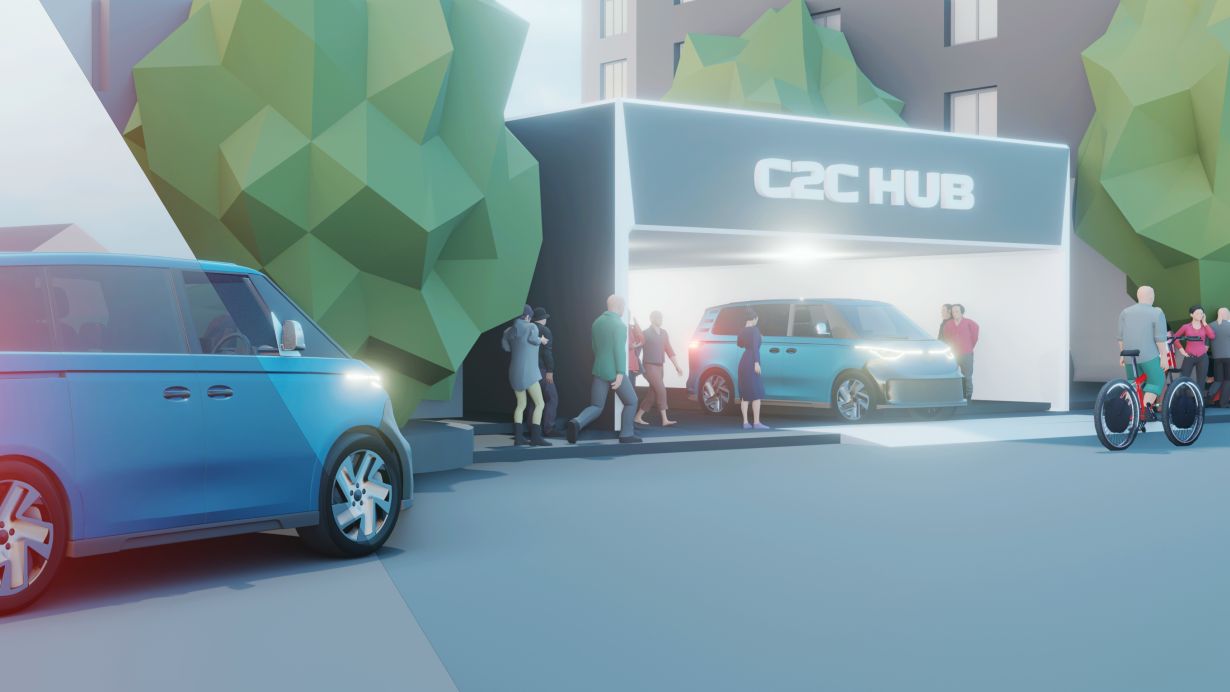
TRK is pleased about the funding of the project "TransBIB" - TRANSFERNETZWERK ZUR BESCHLEUNIGUNG DER INDUSTRIELLEN BIOÖKONOMIE
More than 20 stakeholders from the industrial bioeconomy's model regions are pooling their expertise in the nationwide TransBIB funding project. Their goal: to accelerate Germany's transformation to an industrial bioeconomy. The project is being funded by the BMWK with EUR 5.6 million.
Date of publication:
February 27, 2024
The bioeconomy concept aims to reduce dependence on non-renewable raw materials and instead rely on biological, renewable resources and biogenic residues. The approach combines ecological sustainability with economic growth. Innovations in the fields of biotechnology, green chemistry and the sustainable use of resources play an important role here.
However, the transfer of bioeconomic developments from research laboratories to industrial production is progressing very slowly. Promising bioeconomic solutions are already available in Germany today, but are often not ready for industrial production. Biotechnological innovations that have been successfully developed in the laboratory must first be validated in an industry-oriented environment before production can be scaled up and market acceptance can be generated with a corresponding willingness to invest. As the test environment required for this, e.g. the construction of demonstration plants, is very cost-intensive and associated with technical and regulatory challenges, experts refer to this phase of the technology maturity model as the 'Valley of Death'.
The aim of the nationwide TransBIB funding project is to accelerate the transfer and scaling of bioeconomic innovations:
✔️ Networking bioeconomy stakeholders "bottom-up" throughout Germany
The TransBIB transfer network links the example regions of the industrial bioeconomy and pools expertise in research, industry and politics in order to make scalable bioeconomy technologies accessible to industry more quickly from the bottom up. TransBIB forms the national framework for accelerating the bioeconomy and actively promotes cooperation with the state ministries responsible for the bioeconomy, including the Federal Government's Bioeconomy Council and the Industrial Bioeconomy Dialogue Platform.
✔️ Inventory of the "one-stop store" bioeconomy
Knowledge on the bioeconomy has so far been very scattered and fragmented. TransBIB is therefore conducting a Germany-wide inventory of industrial sites and databases in order to subsequently bundle them in a new "one-stop store". In addition, expert networks are preparing important bioeconomy topics and communicating them to specific target groups.
✔️ Prediction and evaluation of new bio-based value chains
New bio-based value chains are needed to achieve independence from oil. To this end, a digital tool is used to digitally record material flows in the sample regions, make them usable and thus develop new value creation networks. These are then evaluated in terms of their feasibility and sustainability and proposed to the example region for implementation.
✔️ Easy access to regulatory and certification issues
TransBIB will provide easy access to regulatory issues and certification for companies and develop proposals to simplify them.
✔️ Training the specialists of the future
The transition of the economy to bio-based circular systems requires new skills for industry specialists. TransBIB is therefore developing future-oriented training concepts to counteract a shortage of skilled workers in Germany.
The "TransBIB" project is funded by the Federal Ministry for Economic Affairs and Climate Protection (BMWK) as part of the "Directive to promote the use and construction of demonstration plants and model regions for the industrial bioeconomy" with a total of over €5.6 million. The project sponsor is VDI Technologiezentrum GmbH. The first funding period runs for 36 months from October 2023 to September 2026.
The TransBIB consortium consists of 14 partner organizations, including universities, research institutes, innovation clusters and regional development companies as well as other associated partners and subcontractors. The joint project is headed by Dr. Matthias S. Scholz at the Technical University of Munich.
TransBIB@TRK
TechnologieRegion Karlsruhe GmbH is involved in the project, particularly in the areas of networking stakeholders and regions, internationalization and the creation of new value chains and business areas.
Contact: Dr. Petra Jung-Erceg | [email protected]
Further links:
- Federal Ministry of Economics and Climate Protection (BMWK):
https://www.bmwk.de/Navigation/DE/Home/home.html
- BMWK example regions of the industrial bioeconomy:
https://www.bmwk.de/Navigation/Karte/SiteGlobals/Forms/Formulare/karte-beispielregionen-formular.html?queryResultId=null&pageNo=0
- Federal Government Bioeconomy Council:
https://www.biooekonomierat.de/
- Dialogue platform industrial bioeconomy:
https://www.bmwk.de/Redaktion/DE/Dossier/industrielle-biooekonomie-wachstum-und-innovation.html
- Funding guideline:
https://www.bmwk.de/Redaktion/DE/Downloads/F/foerderrichtlinie-industrielle-biooekonomie.pdf?__blob=publicationFile&v=1
- Bioeconomy in the Karlsruhe TechnologyRegion:
https://trk.de/kernk
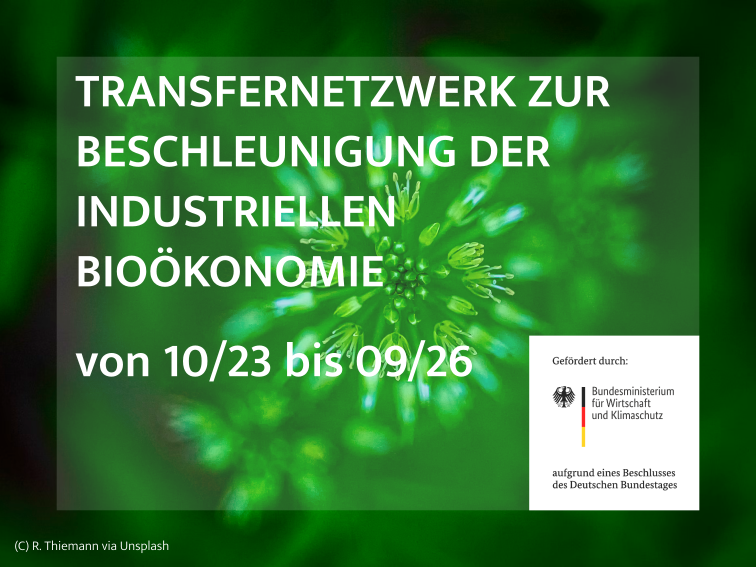
Transport Minister Dr. Volker Wissing visits lithium extraction optimization plant in Landau, Rhineland-Palatinate
First plant for the production of green lithium on a ton scale worldwide
Date of publication:
November 29, 2023
Federal Transport Minister Dr. Volker Wissing visited Vulcan's newly opened lithium extraction optimization plant (LEOP) in Landau, Rhineland-Palatinate, on Saturday, 25 November. The LEOP will be the first plant in the world to produce green, climate-neutral lithium on a tonne scale. During his visit, the Transport Minister emphasized the importance of domestic raw material extraction for the German and European battery and automotive industry. Petra Dick-Walther, State Secretary for Economic Affairs in Rhineland-Palatinate, and Hans-Peter Behrens, Member of the Baden-Württemberg State Parliament, also visited the Vulcan plant with Wissing. On the day of the official opening, numerous local politicians and representatives of public interests, such as Dr. Dominik Geissler, Mayor of Landau, and Andreas Tschauder, Head of the Rhineland-Palatinate State Office for Geology and Mining, celebrated the commissioning of the LEOP together with Vulcan representatives.
With the LEOP, Vulcan is also opening the first plant on European soil that will provide lithium extracted entirely in Europe on a ton scale. Vulcan has set itself the goal of becoming the world's first producer of green lithium while at the same time providing renewable energy. Using deep geothermal energy, the company will extract lithium from the lithium-rich, hot brine of the Upper Rhine Graben and at the same time provide renewable energy for local communities and industry. With this project, Vulcan is aiming to establish Europe's first safe and sustainable lithium supply chain and support the German and European battery and automotive industries in their transformation towards a climate-neutral future.
For almost three years, Vulcan successfully tested lithium extraction from the thermal water of the Upper Rhine Graben for 18,000 hours in pilot plants in Insheim and Landau (Rhineland-Palatinate). The results show high lithium extraction rates and use of the sorbent tested without signs of wear over several thousand cycles. Vulcan uses VULSORB®, a sorbent developed in-house, in the process. Compared to conventional products, this has a higher efficiency.
During his visit, the Minister of Transport emphasized the need for domestic raw material production in view of the ramp-up of electromobility. The European Union has decided to phase out combustion engines by 2035. The automotive industry is dependent on the procurement of large quantities of critical battery raw materials. Europe currently obtains more than 80% of the lithium it needs from refineries in China. With the Critical Raw Materials Act and the Net Zero Act, the European Union has underpinned its decision to reduce the existing dependency in this area. Domestic raw materials projects are to be promoted.
"What we are seeing today in Landau with the new Vulcans plant is a small revolution," said Wissing during his visit. "For the first time, a plant will produce tons of lithium entirely in Europe - and in a climate-neutral way. Extracting raw materials locally is the key to a self-sufficient and secure supply for Europe. The extraction of lithium from thermal water in the Upper Rhine Graben is a promising opportunity with great potential to establish a secure, independent lithium supply chain in Europe. This creates new jobs and strengthens Germany as a location for innovation and business."
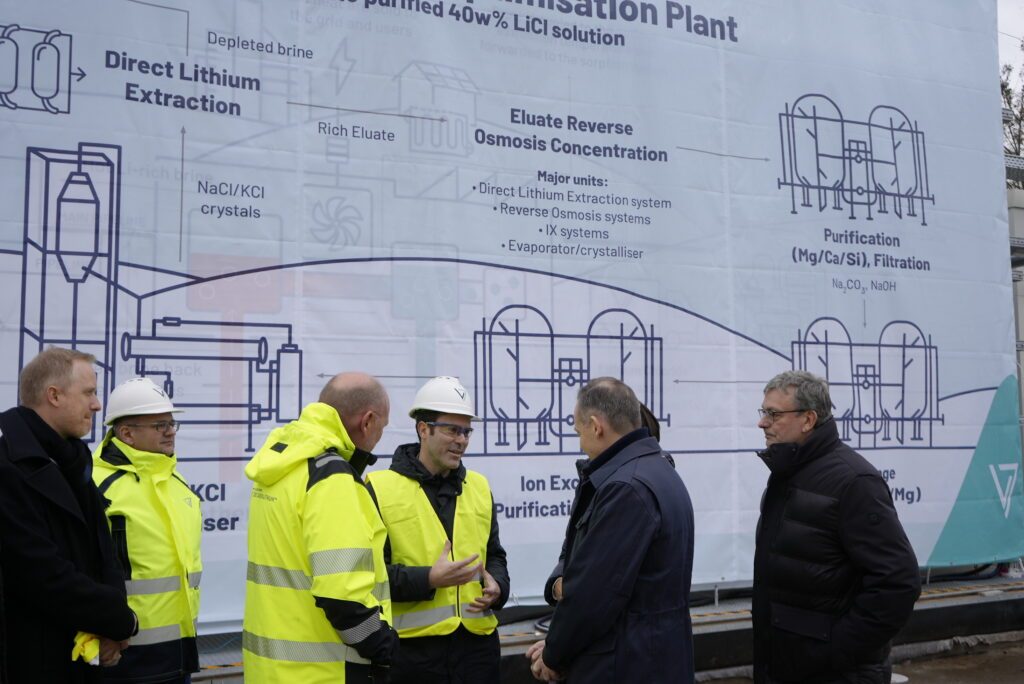
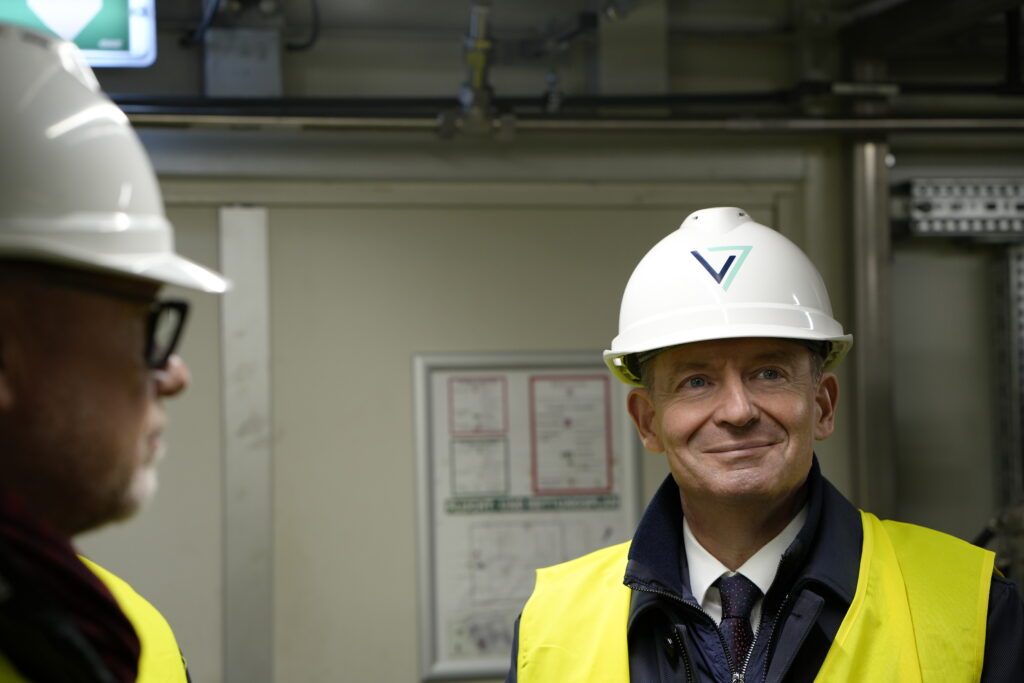
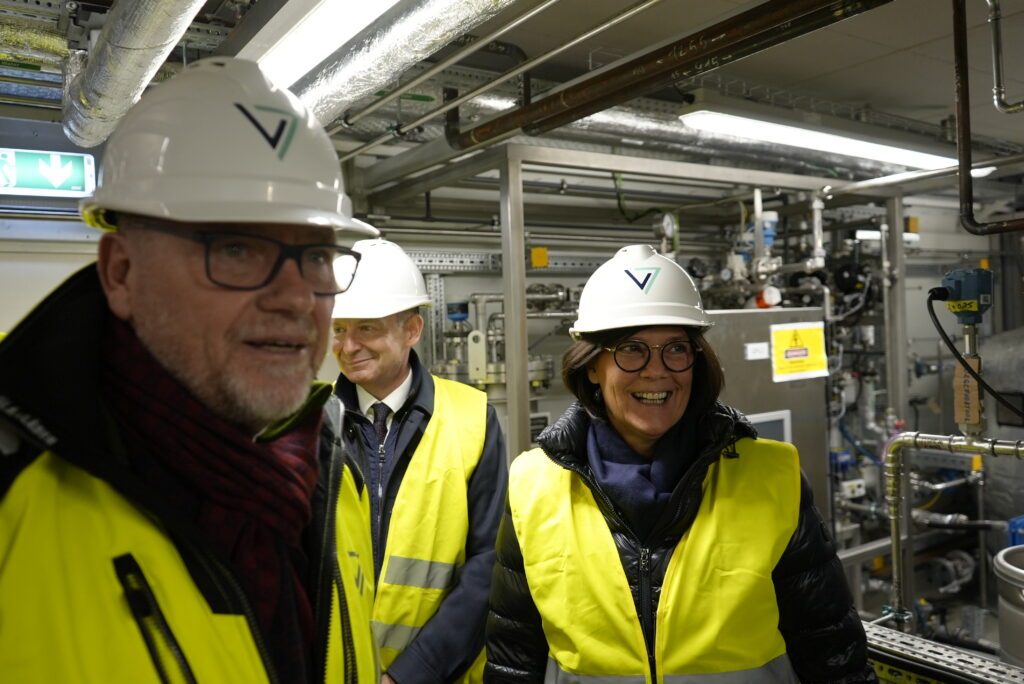
Successful exchange on the topic of securing skilled workers in the automotive industry in Rastatt
"The technology of tomorrow must be learned today."
Date of publication: November 24, 2023
The further education and training of transformation processes in the automotive industry requires new skills, according to Jochen Ehlgötz, Managing Director of TechnologieRegion Karlsruhe (TRK) GmbH, who hosted the 5th edition of the Business Breakfast Transformation of the Regional Automotive Industry on November 14 in the Reithalle Rastatt in front of around 60 guests. The joint event organized by Automotive Engineering Networks (aen), the city of Rastatt and TRK GmbH showcased support options, funding opportunities and many examples of best practice - also with a view to markets and international specialists.
The transformation is bringing major changes for employees, explained Rastatt's outgoing mayor Hans Jürgen Pütsch, precisely because companies are also thinking in decades: It is necessary to network across borders, according to the head of the town hall, who thanked for the thematic treatment of the topic. It is particularly important that contacts are also established and maintained between companies, after all, change is sometimes already taking place within companies. "This is both a risk and an opportunity," said Pütsch, especially in the area of mobility, where priorities are shifting, "also for politics!"
In a panel discussion with examples of best practice, Julia Kraft, Head of HR at mobility service provider Wackenhut GmbH & Co. KG and Dr. Falk Hartmann, principal of the Carl-Benz-Schule Gaggenau, shared insights into their work with (prospective) trainees. Against the backdrop of changing job profiles and the transformation of technology, alternative drive types, sensor technology and AI must already be taught at school. This makes an intensive dialog between schools and companies all the more important - the technology of tomorrow must be learned today. The discussion showed that appreciating the work, identifying with the company by building up emotions and increasing the value of training can be strategies for attracting and retaining trainees.
Marco Baumgartner from the Institute for Learning and Innovation in Networks (ILIN) at Karlsruhe University of Applied Sciences used the "KARL" project ("Artificial Intelligence for Work and Learning in the Karlsruhe Region") to shed light on the topic of "future technology AI" and the skills that specialists need for the upcoming transformation. "KARL" addresses skills in the context of AI and examines the implementation of these in companies.
Whether retraining, partial qualification, further training support for employees in companies or careers advice: Tanja Bäuerle and Steffen Dorst from the Employer Service of the Karlsruhe-Rastatt Employment Agency discussed possible support in all phases of working life. Low-threshold offers are important, and a personal approach is also a success factor in the company. When it comes to qualifications, it is important to build on strengths.
Regine Zizelmann from the Baden-Württemberg State Network for Continuing Education Guidance highlighted continuing education guidance as a cross-sectional task for overcoming the shortage of skilled workers: educational guidance is definitely also a management tool and must be brought into companies to combat the shortage of skilled workers.
Petra Bender from the Welcome Center of the Karlsruhe TechnologyRegion spoke about attracting and retaining international skilled workers at TRK . The international approach to securing skilled workers is also of enormous importance for the region. Whether companies, local authorities or research institutions: the Welcome Center offers targeted advice, from recruitment and residence law issues to integration into the company.
Tim Siegel from the Landeslotsenstelle Transformationswissen BW addressed the topic of consulting vouchers. Among other things, medium-sized companies in the automotive supply industry could receive support ranging from strategy consulting to process optimization.
Information and further dates can be found at www.ae-network.de and at the Karlsruhe Mobility Lab.
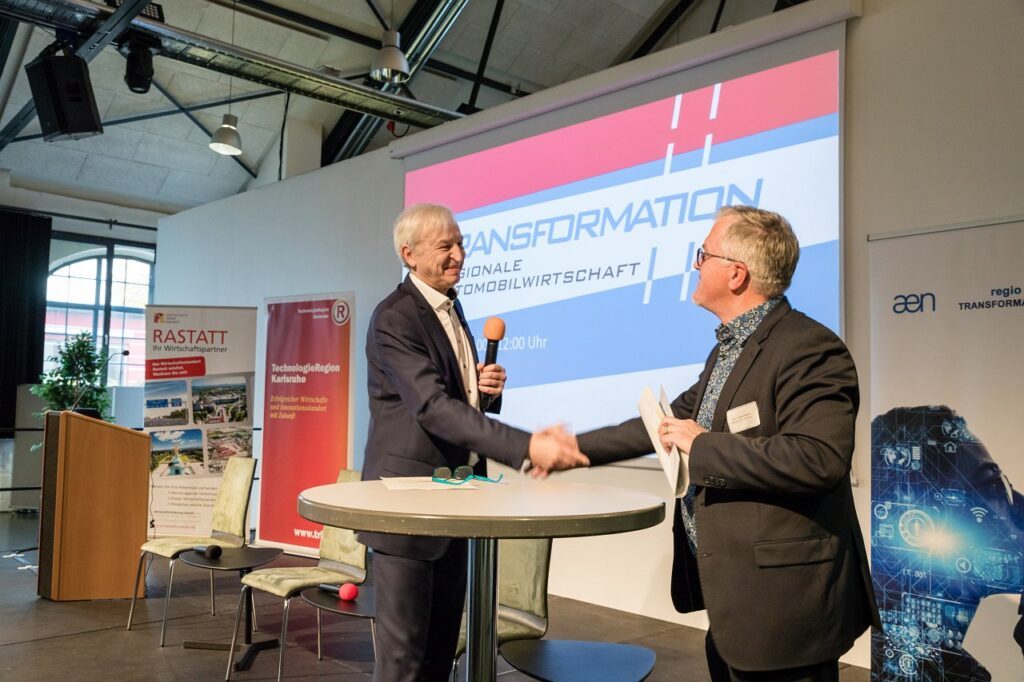
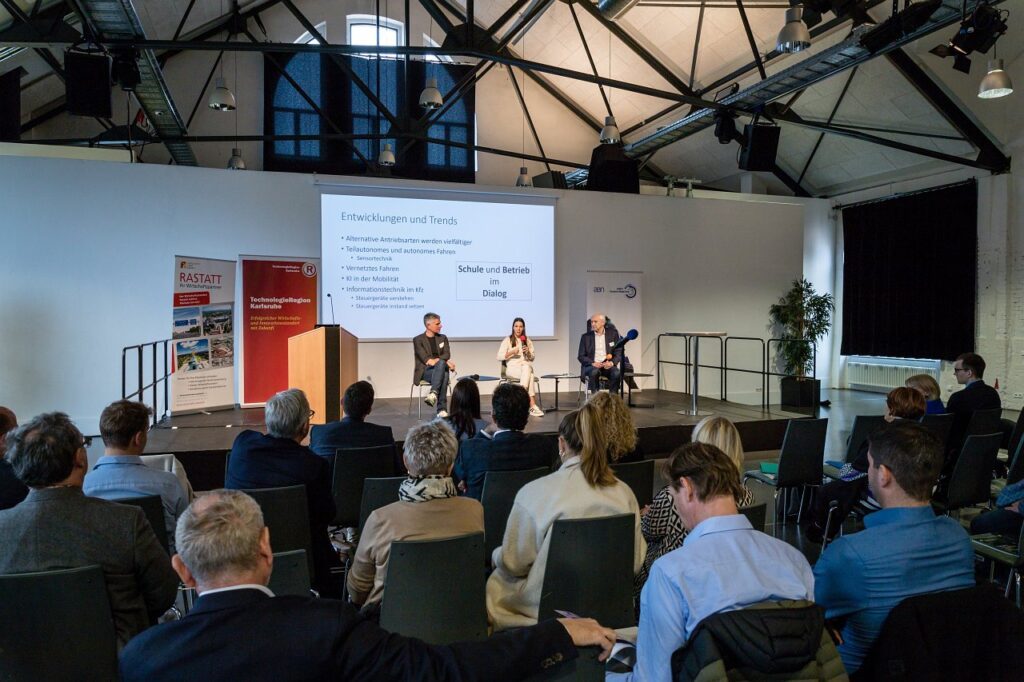
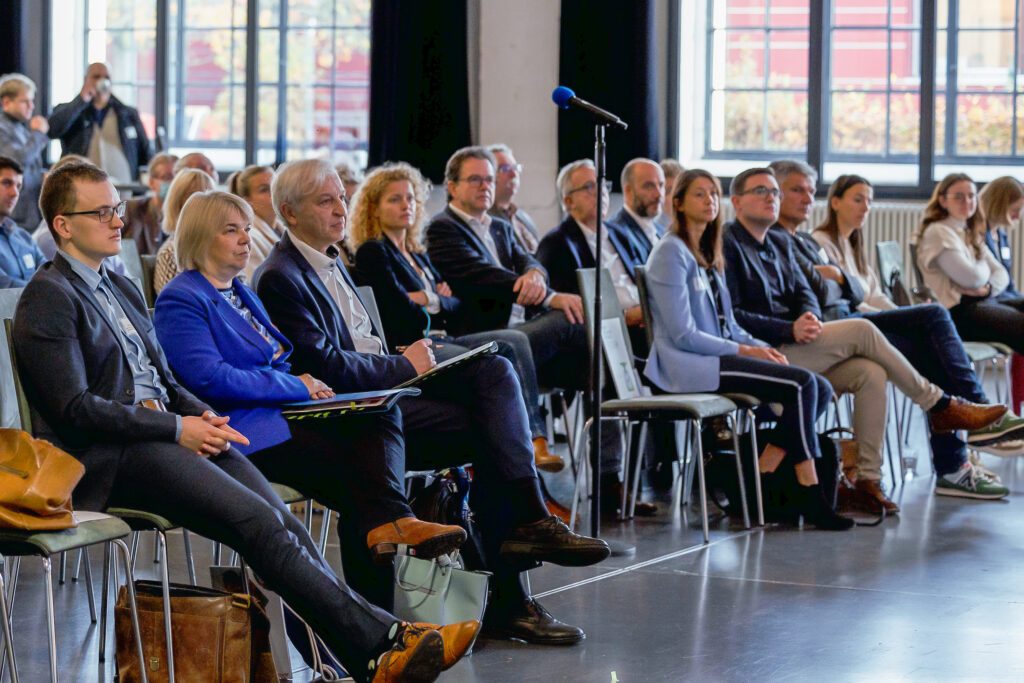
Videos of the Karlsruhe TechnologyRegion
You can find all videos about the Karlsruhe TechnologyRegion and its exciting projects on our YouTube channel.
You haven't subscribed to our newsletter yet?
Then it's high time you did! We will inform you about the latest news from the Karlsruhe TechnologyRegion at regular intervals.
Stay up to date with our newsletter!
"*" indicates required fields
